
(May, 2024 | No. 5 | Vol. 68)
5/1/2024

Truth Magazine (ISSN 1538-0793) is published once a month by Truth Publications, Inc., 220 S. Marion, Athens, AL 35611.
© 2024 Truth Publications, Inc. All Rights Reserved.
Manuscripts should be sent to the editor, Mark Mayberry, at mark@truthpublications.com. Link.
Subscriptions, renewals & other correspondence should be sent to: Truth Magazine, 220 S. Marion, Athens, AL 35611 or by emailing us at subscriptions@truthmagazine.com. Link.
Book orders should be sent to: CEI Bookstore | truthbooks.com | Street Address: 220 S. Marion, Athens, AL 35611 | Phone: (855) 492-6657 | Email: sales@truthbooks.com Link.
Online Website: truthmagazine.com
DISCLAIMER: Books in ads are screened, but an ad does not mean unqualified endorsement. All books should be tested by Scripture. We appreciate readers notifying us if they find some glaring fault in the ads.
By Mark Mayberry
Synopsis: The theme section of this issue of Truth Magazine focuses on Peter’s famous admonition concerning spiritual growth (2 Pet. 1:5-11). Here we examine his introductory exhortation: “Now for this very reason also, applying all diligence, in your faith supply moral excellence. . . knowledge. . . self-control. . . perseverance. . . godliness. . . brotherly kindness. . . and. . . love” (NASB).
Diligence is a frequent topic of poetry and prose:
Gardens are not made by singing “Oh, how beautiful!” and sitting in the shade—Rudyard Kipling, Complete Verse.
What we hope ever to do with ease, we must first learn to do with diligence—Samuel Johnson, The Life of Samuel Johnson, and the Journal of His Tour to the Hebrides, Vol. 4 of 5.
Diligence is the mother of good fortune, and the goal of a good intention was never reached through its opposite, laziness—Miguel de Cervantes.
The biblical concept of diligence is communicated by the Greek noun spoudē, derived from the verb speudō (to hasten, urge on), which signifies “haste” or “diligence” (Thomas, 4710). The Greek noun spoudē (4710) is part of a larger Greek word family. The verb spoudazō means “to make haste, hence to give diligence” (Thomas, 4704). The adjective spoudaios is descriptive of someone who is “hasty, eager, diligent” (Thomas, 4705). The adverb spoudaiōs means to act “with haste, diligently” (Thomas, 4709).
Arndt defines spoudē as “(1) swiftness of movement or action, haste, speed; (2) earnest commitment in the discharge of an obligation or experience of a relationship, eagerness, earnestness, diligence, willingness, zeal often in Greco-Roman literature and inscriptions of extraordinary commitment to civic and religious responsibilities, which were frequently intertwined, and also of concern for personal moral excellence or optimum devotion to the interests of others” (BDAG, 939-940). Louw and Nida say it means “to be eager to do something, with the implication of readiness to expend energy and effort” (25.74, 297). Thayer defines it as “(1) haste; (2) earnestness, diligence in accomplishing, promoting, or striving after anything” (Thayer, 585).
Occurring in 12 New Testament verses (Mark 6:25; Luke 1:39; Rom. 12:8, 11; 2 Cor. 7:11, 12; 2 Cor. 8:7-8, 16; Heb. 6:11; 2 Pet. 1:5; Jude 3), it is rendered “diligence” (4x), “earnestness” (5x), “effort” (1x), “hurry” (2x) in the NASB.
Some are in a hurry to do evil. For example, Herodias conspired with her licentious daughter to exact revenge on John the Baptist (Mark 6:19-25, esp. v. 25). Let us avoid associating with sinners whose feet run to evil (Prov. 1:10-16).
Others are in a hurry to share good news. After the angel, Gabriel, foretold the birth of Jesus and John, Mary arose and travelled with haste to the hill country of Judah to visit her cousin, Elizabeth, to share in their mutual maternal joy (Luke 1:26-45, esp. v. 39). Like the psalmist, may we eagerly desire to share in fellowship with those who worship the God of heaven (Ps. 122:1-4). May we also be committed to sharing the good news of salvation with a lost and dying world (Rom. 10:14-15).
Christians should eagerly serve in whatever capacity their talents and circumstances allow (Rom. 12:3-13, esp. vv. 8 & 11).
For through the grace given to me I say to everyone among you not to think more highly of himself than he ought to think; but to think so as to have sound judgment, as God has allotted to each a measure of faith. For just as we have many members in one body and all the members do not have the same function, so we, who are many, are one body in Christ, and individually members one of another. Since we have gifts that differ according to the grace given to us, each of us is to exercise them accordingly: if prophecy, according to the proportion of his faith; if service, in his serving; or he who teaches, in his teaching; or he who exhorts, in his exhortation; he who gives, with liberality; he who leads, with diligence; he who shows mercy, with cheerfulness. Let love be without hypocrisy. Abhor what is evil; cling to what is good. Be devoted to one another in brotherly love; give preference to one another in honor; not lagging behind in diligence, fervent in spirit, serving the Lord; rejoicing in hope, persevering in tribulation, devoted to prayer, contributing to the needs of the saints, practicing hospitality (Rom. 12:3-13).
Like Titus, we should manifest diligence in serving the cause of Christ and addressing the needs of our brethren (2 Cor. 8:16-24, esp. v. 16).
But thanks be to God, who puts the same earnestness on your behalf in the heart of Titus. For he not only accepted our appeal, but being himself very earnest, he has gone to you of his own accord. We have sent along with him the brother whose fame in the things of the gospel has spread through all the churches; and not only this, but he has also been appointed by the churches to travel with us in this gracious work, which is being administered by us for the glory of the Lord Himself, and to show our readiness, taking precaution so that no one will discredit us in our administration of this generous gift; for we have regard for what is honorable, not only in the sight of the Lord, but also in the sight of men. We have sent with them our brother, whom we have often tested and found diligent in many things, but now even more diligent because of his great confidence in you. As for Titus, he is my partner and fellow worker among you; as for our brethren, they are messengers of the churches, a glory to Christ. Therefore, openly before the churches, show them the proof of your love and of our reason for boasting about you (2 Cor. 8:16-24).
Like the Corinthian church, we should manifest diligence in correcting wrongs (2 Cor. 7:5-13, esp. vv. 11 & 12).
For even when we came into Macedonia our flesh had no rest, but we were afflicted on every side: conflicts without, fears within. But God, who comforts the depressed, comforted us by the coming of Titus; and not only by his coming, but also by the comfort with which he was comforted in you, as he reported to us your longing, your mourning, your zeal for me; so that I rejoiced even more. For though I caused you sorrow by my letter, I do not regret it; though I did regret it—for I see that that letter caused you sorrow, though only for a while—I now rejoice, not that you were made sorrowful, but that you were made sorrowful to the point of repentance; for you were made sorrowful according to the will of God, so that you might not suffer loss in anything through us. For the sorrow that is according to the will of God produces a repentance without regret, leading to salvation, but the sorrow of the world produces death. For behold what earnestness this very thing, this godly sorrow, has produced in you: what vindication of yourselves, what indignation, what fear, what longing, what zeal, what avenging of wrong! In everything, you demonstrated yourselves to be innocent in the matter. So although I wrote to you, it was not for the sake of the offender nor for the sake of the one offended, but that your earnestness on our behalf might be made known to you in the sight of God. For this reason, we have been comforted. And besides our comfort, we rejoiced even much more for the joy of Titus, because his spirit has been refreshed by you all (2 Cor. 7:5-13).
Like the Macedonians, we should manifest diligence in coming to the aid of needy saints (2 Cor. 8:1-15, esp. vv. 7 & 8).
Now, brethren, we wish to make known to you the grace of God which has been given in the churches of Macedonia, that in a great ordeal of affliction their abundance of joy and their deep poverty overflowed in the wealth of their liberality. For I testify that according to their ability, and beyond their ability, they gave of their own accord, begging us with much urging for the favor of participation in the support of the saints, and this, not as we had expected, but they first gave themselves to the Lord and to us by the will of God. So we urged Titus that as he had previously made a beginning, so he would also complete in you this gracious work as well. But just as you abound in everything, in faith and utterance and knowledge and in all earnestness and in the love we inspired in you, see that you abound in this gracious work also. I am not speaking this as a command, but as proving through the earnestness of others the sincerity of your love also. For you know the grace of our Lord Jesus Christ, that though He was rich, yet for your sake He became poor, so that you through His poverty might become rich. I give my opinion in this matter, for this is to your advantage, who were the first to begin a year ago not only to do this, but also to desire to do it. But now finish doing it also, so that just as there was the readiness to desire it, so there may be also the completion of it by your ability. For if the readiness is present, it is acceptable according to what a person has, not according to what he does not have. For this is not for the ease of others and for your affliction, but by way of equality—at this present time your abundance being a supply for their need, so that their abundance also may become a supply for your need, that there may be equality; as it is written, “HE WHO gathered MUCH DID NOT HAVE TOO MUCH, AND HE WHO gathered LITTLE HAD NO LACK” (2 Cor. 8:1-15).
In contrast with the failed example of Israel in the wilderness, we should manifest diligence throughout our earthly sojourn (Heb. 6:4-12, esp. v. 11).
For in the case of those who have once been enlightened and have tasted of the heavenly gift and have been made partakers of the Holy Spirit, and have tasted the good word of God and the powers of the age to come, and then have fallen away, it is impossible to renew them again to repentance, since they again crucify to themselves the Son of God and put Him to open shame. For ground that drinks the rain which often falls on it and brings forth vegetation useful to those for whose sake it is also tilled, receives a blessing from God; but if it yields thorns and thistles, it is worthless and close to being cursed, and it ends up being burned. But, beloved, we are convinced of better things concerning you, and things that accompany salvation, though we are speaking in this way. For God is not unjust so as to forget your work and the love which you have shown toward His name, in having ministered and in still ministering to the saints. And we desire that each one of you show the same diligence so as to realize the full assurance of hope until the end, so that you will not be sluggish, but imitators of those who through faith and patience inherit the promises (Heb. 6:4-12).
The theme section of this issue of Truth Magazine focuses on Peter’s famous admonition concerning spiritual growth (2 Pet. 1:5-11, esp. v. 5-7). These qualities are sometimes called “The Christian Graces,” which, of course, are similar to Paul’s description of the Spirit’s fruit that each of us must bear (Gal. 5:22-23). Near the end of Simon’s life (“knowing that the laying aside of [his] earthly dwelling [was] imminent”), the aged apostle exhorted his readers:
Now for this very reason also, applying all diligence, in your faith supply moral excellence, and in your moral excellence, knowledge, and in your knowledge, self-control, and in your self-control, perseverance, and in your perseverance, godliness, and in your godliness, brotherly kindness, and in your brotherly kindness, love. For if these qualities are yours and are increasing, they render you neither useless nor unfruitful in the true knowledge of our Lord Jesus Christ. For he who lacks these qualities is blind or short-sighted, having forgotten his purification from his former sins. Therefore, brethren, be all the more diligent to make certain about His calling and choosing you; for as long as you practice these things, you will never stumble; for in this way the entrance into the eternal kingdom of our Lord and Savior Jesus Christ will be abundantly supplied to you (2 Pet. 1:5-11).
Like Jude, we should manifest diligence in communicating the message of salvation, and in contending for the faith (Jude 3-4).
Beloved, while I was making every effort to write you about our common salvation, I felt the necessity to write to you appealing that you contend earnestly for the faith which was once for all handed down to the saints. For certain persons have crept in unnoticed, those who were long beforehand marked out for this condemnation, ungodly persons who turn the grace of our God into licentiousness and deny our only Master and Lord, Jesus Christ (Jude 3-4).
In other words, we must preach the whole counsel of God (Acts 20:26-27), and also address specific issues wherein gospel truth is under assault (Titus 1:10-14).
May we diligently maintain our relationship with brethren (Eph. 4:3) and with our Lord and Savior (2 Pet. 3:14). Let us diligently study biblical truth (2 Tim. 2:15), and diligently remember the same (2 Pet. 1:15). If we diligently pursue our heavenly calling (2 Pet. 1:10), we will realize our heavenly reward (Heb. 4:11).
Arndt, William, et al. A Greek-English Lexicon of the New Testament and Other Early Christian Literature (BDAG). Chicago, IL: University of Chicago Press, 2000.
Louw, Johannes P. and Eugene Albert Nida. Greek-English Lexicon of the New Testament: Based on Semantic Domains. New York: United Bible Societies, 1996.
Thayer, Joseph Henry. A Greek-English Lexicon of the New Testament. New York: Harper & Brothers, 1889.
Thomas, Robert L. New American Standard Hebrew-Aramaic and Greek Dictionaries: Updated Edition. Anaheim, CA: Foundation Publications, Inc., 1998.
Mark Mayberry has labored with the Adoue Street church of Christ in Alvin, TX, since 1998, where he serves as the evangelist and an elder. The church website is here. His website is here. He can be reached here.




By Kyle Pope
Synopsis: What was involved in the practice of crucifixion in the first century? Brother Pope surveys evidence that helps us better understand exactly what was involved in Jesus’s death on the cross.
Matthew 27:35 records the simple words: “Then they crucified Him, and divided His garments, casting lots” (NKJV). These few words record what was in the same moment the most horrific and yet most wondrous event this world has ever known. Yet what do we know about it? Do we really understand the scope of what Christ endured for us? The apostle Paul spoke of “the offense of the cross” (Gal. 5:11). The Roman statesman Cicero called crucifixion “the most miserable and most painful punishment appropriate to slaves alone” (Against Verres, 2.5.169). Crucifixion was not considered an honorable way to die, and yet the Lord of all the universe poured out His life on a cross. My brother in the flesh and spirit, Curtis Pope has suggested, “Knowledge of the process of crucifixion certainly adds profound meaning to Matthew 27:35 which, in understated fashion, simply mentions ‘when they had crucified Him’ to record the horrors” of the cross (“Taking Up the Cross,” 152). In this study and the next, we will explore what it really means when the Holy Spirit tells us “they crucified Him.”
While the Romans certainly perfected its practice, they did not invent crucifixion. In the period between the Old and New Testament, the Seleucid king Antiochus Epiphanes practiced crucifixion (Josephus, Antiquities 12.5.4), and the Hasmonean ruler Alexander Jannaeus crucified 800 men (ibid. 13.14.2). The Qumran text, known as the Temple Scroll, commands “hanging on wood” (thought to be an allusion to crucifixion) as the punishment for treason (11QTemple 64.6-13).
Roman crucifixion was usually carried out in three phases: flagellation (a severe scourging intended to weaken the victim); crucifixion (the actual binding of the victim to a cross); and finally, crurifragium (breaking the legs of the victim to hasten death) (Sava, “The Wound in the Side of Christ,” 343). Although flagellation (or scourging) could be administered alone, it was often the first stage of crucifixion. Lucian wrote of “those who died by the scourge and the cross” (Cataplus 6.18-20) or who “die by crucifixion or the scourge” (Juppiter Tragoedeus 19). The severity of the scourging determined the time the victim spent on the cross. It is well attested that scourging often resulted in death (Horace, Satires 1.2.41; Seneca, On Mercy 1.15.1; Babylonian Talmud, Ketuboth 86b). Eusebius records accounts of witnesses to the scourging of Christians in the second century seeing their bodies torn to such a degree that their “entrails and organs were exposed to sight” (Ecclesiastical History 4.15.4).
When a victim was finally put on the cross, crucifixion was usually a slow and lingering death. Horace described ravens feeding on the bodies that hung on a cross (Epistles 1.16.48). Seneca wrote:
Can anyone be found who would prefer wasting away in pain dying limb by limb, or letting out his life drop by drop, rather than expiring once for all? Can any man be found willing to be fastened to the accursed tree, long sickly, already deformed, swelling with ugly wounds on shoulders and chest, and drawing the breath of life amid long drawn-out agony? He would have many excuses for dying even before mounting the cross (Moral Epistles to Lucilius 101.14).
There were different forms of crosses that were used. The most basic, the Romans called the crux simplex (or stipes)—I. This was a simple vertical stake to which a victim was nailed, tied or even impaled (Seneca, Moral Epistles to Lucilius 14.5). It is believed that the Romans first adopted the use of this form of punishment from the Phoenicians after the Punic wars. The Romans had long practiced the custom of parading condemned men to their death bound to a wooden yoke called a patibulum (or furca). The Roman historian, Livy, describes a slaveholder punishing a condemned slave by driving him through the forum bearing a “yoke (furca)” and scourging him while he went (History of Rome 2.36.1). Plutarch describes the same custom, using the Greek word xulon used in Acts 5:30 of the “cross” (or “tree”) on which Jesus was hung (Coriolanus 24.5).
The Romans combined the simple stake with the yoke or cross-beam to form the crux compacta, which could take several forms: the crux immissa (or capita)—†; the crux commissa (or tau)—T; and the crux decussata—X. The Roman poet, Plautus, described the combination of these two elements, describing a condemned man “with hands spread out and nailed to the patibulum” (Miles Gloriosus 2.4), and declaring of another, “let him bear the yoke (patibulum) through the city; then let him be nailed to the cross (crux)” (Fragments, Carbonaria fr. 2). The picture here is that of carrying the cross-beam, which would be attached to the upright when actually crucified. Ancient writers used the Greek words stauros and xulon (applied in the New Testament to the cross) of these same shapes of crosses (Lucian, Judicium Vocalium 12; Plutarch, On The Delays of Divine Vengeance 9; Epictetus, Discourses 3.26.22; LXX, Deut. 21:22-23; cf. 11QTemple 64.6-13).
The New Testament does not specify the form of the cross on which Jesus was crucified, but it is likely that it was a cross-beam form of some type. Four second-century writers support this conclusion. Ignatius speaks of the “rope” that draws one up to be “raised up” on a cross (Second Epistle to the Ephesians 14), possibly referring to raising a patibulum into place. Justin described Jesus’s cross as a beam set upright with a beam raised up to it (Dialogue 91). Tertullian described Jesus’s cross as consisting of a “cross-beam (antenna)” and a “projecting seat (sedile)” (Ad Nationes 1.12; cf. Contra Marcian 3.18). The sedile was a short post that went between the victim’s legs in order to bear some of the weight of the body. The first century pagan Roman author, Seneca, attests to the common use of the sedile (Moral Epistles to Lucilius 101.10-12). Justin Martyr described the sedile of Christ’s cross projecting “out like a horn” (Dialogue 91). Irenaeus claimed the cross of Christ had five extremities, describing the height and length but also the seat, “on which the person rests who is fixed by the nails” (Against Heresies 2.24.4). In spite of the numerous depictions of Christ on a crucifix with a foot-rest, Wilkinson explains, that this, “was an invention of medieval Christian art, and is not mentioned by any ancient author as part of the cross used for crucifixion” (106).
The Watchtower Bible and Tract Society, the publishing house of the Jehovah’s Witnesses, is adamant in their claim that “Jesus died on an upright stake, and not on the traditional cross” (“Cross,” 90). They argue, “It was not until about 300 years after Jesus’s death that some professed Christians promoted the idea that Jesus was put to death on a two-beamed cross” (“Did Jesus Really Die on a Cross?”). Their motivation for this position is likely opposition to the idolatrous worship of religious images of Christ on a two-beam cross. We agree that symbols of a crucifix should never be treated as objects of veneration. However, the clear claims of early church writers, the linguistic usage of stauros and xulon, and the evidence from pagan Greek and Roman authors force us to acknowledge that two-beamed crosses were in common use in the first century.
One of the earliest evidences of this in connection with Christ is found in the so-called Alexamenos Graffito discovered etched into a plaster wall on the Palatine Hill in Rome. This mocking, anti-Christian graffiti depicts Christ on a two-beamed cross with the head of a donkey. Beneath, a worshipper is pictured with the words “Alexamenos worships his God.” This etching is believed to date between the first and third centuries and is now kept in the Palatine Antiquarian Museum in Rome.
Apparently, crucifixion did not always involve nailing the feet. This has led some scholars to question whether Jesus’s feet would have been nailed. It is clear, however, that in the case of Jesus, after His resurrection, He told His disciples, “Behold My hands and My feet” (Luke 24:39). Psalm 22:16 had prophesied, “The congregation of the wicked has enclosed me. They pierced my hands and my feet” (Ps. 22:16). In the second century, Justin and Tertullian both applied this prophecy to Jesus (Justin, First Apology 35; Dialogue 97; Tertullian, Against Marcian 3.19). What we don’t know is whether Jesus’s feet would have been crossed with a single nail or with two nails. Plautus spoke of one put on a cross being fastened “twice in his feet and twice in his arms” (Mostellaria 2.1).
Were Jesus’s feet nailed with soles against the wood, or to the sides of the cross? In 1968, north of Mount Scopus, in an area of Jerusalem known as Giv’at ha-Mivtar, an ossuary (or bone box) was found containing the bones of an adult male that dated to the first century. The man was clearly the victim of crucifixion, as revealed by the fact that a large nail was still driven through the right heel bone. Wood fragments were still present under the head and tip of the nail, indicating that it had first been driven into a wooden plate before it was nailed through the man’s heal and into the cross. This likely was intended to prevent the heel from slipping off the nail. Dr. N. Haas, of Hebrew University, who wrote the initial report about the remains, claimed that the size of the nail indicated that, “the feet had not been securely fastened to the cross” leading him to conclude that a seat such as those mentioned by Irenaeus and Tertullian must have been used to support the body (58). The man’s legs were broken, similar to what is described of the thieves crucified with Jesus (John 19:32).
We cannot know exactly how Jesus was nailed to the cross. Josephus records that during the siege of Jerusalem, Jews who were captured were crucified in different positions in order to mock them. At that time, so many were killed “room was wanting for the crosses, and crosses wanting for the bodies” (Wars 5.11.1, Whiston). Whatever the form of crucifixion, we can know with certainty that it was a torturous way to die. Our English word excruciating by derivation, literally means “from the cross.”
In our next study, we will look at how a victim sentenced to crucifixion actually died and what Scripture tells us about what Jesus endured for us.
“Cross.” Reasoning from the Scriptures. Brooklyn: Watchtower Bible and Tract Society of New York, Inc., 1989. 89-93.
“Did Jesus Really Die on a Cross?” Watchtower: Official Website of Jehovah’s Witnesses. May 5, 2012; see also here and here.
Haas, N. “Anthropological Observations on the Skeletal Remains from Giv’at ha-Mivtar,” Israel Exploration Journal 20 (1970): 38-59.
Pope, Jesse Curtis. “Taking Up the Cross: The Death of the King.” Jesus for a New Millennium: Studies in the Gospel of Matthew. Edited by Ferrell Jenkins. Florida College Annual Lectures, Feb. 5-8, 2001. Temple Terrace: Florida College Bookstores, 2001, 150-160.
Sava, Anthony F. “The Wound in the Side of Christ.” The Catholic Biblical Quarterly 19 (1957): 343-346.
Wilkinson, John. “The Physical Cause of the Death of Christ.” Expository Times 83.4 (Jan. 1972): 104-107.
Kyle Pope preaches for the Vestavia church of Christ in Vestavia Hills, AL. He has written several books published by Truth Publications. Go here for more information. The church website is here. He can be reached here.



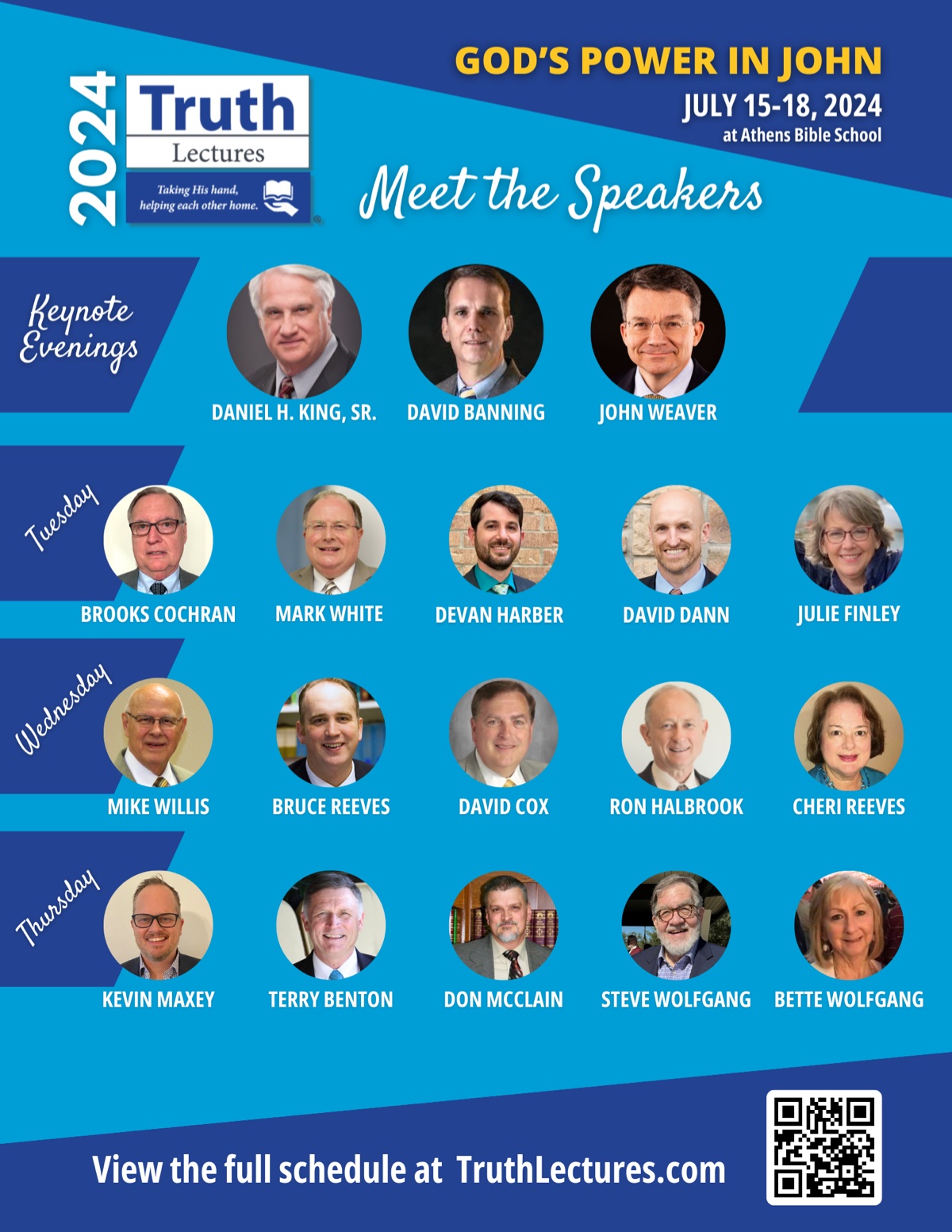
By Jennifer Maxey
Synopsis: It’s spring, and God’s handiwork reminds us that every new life begins with a seed.
Will you plant seeds this spring? Sunny skies, warm breezes, and sparkling creeks lighten our hearts and invite us outside to engage with creation. This nurturing provision of God for seeds (i.e., sowing, growing, bearing fruit) illuminates divine truths about the same cycle in our own lives. The handiwork of God in nature reflects the handiwork of God in us.
Every new life begins with a seed. “Being born again, not of corruptible seed, but of incorruptible, by the word of God, which lives and abides forever” (1 Pet. 1:23). As a base text, this verse informs our view of God’s seed: divine origin, life producing, living, abiding. Your new life begins with God’s seed.
Our Master Teacher decoded the parable, equating “the word” with “the seed.” He said, “When anyone hears the word of the kingdom. . . this is he who received seed.” One day, a businesswoman named Lydia gathered with other women by the river for a time of prayer (Acts 16:14). When an apostle joined their meeting and spoke God’s words, she received those words and believed, bearing fruits of obedience and hospitality. The seed was sown in Lydia.
Likewise, the seed, the implanted word (Jas. 1:21), is sown in you. It is not just a book. Jesus was not just a man. Much more, it is the divine record of the Creator’s will to redeem a subverted and lost creation. This record culminates on earth in the manifestation of grace and truth in the prepared body of Jesus Christ. The Divine Intention became flesh and dwelt among us (John 1:14). Jesus is the Word (John 1:1). God’s seed is the word.
This seed is “the word of God” (1 Pet. 1:23). Finding its origin within God, the seed carries the traits and produces the fruit of deity. Utilized only once in the divine record, spora (1 Pet. 1:23) depicts a unique sowing, the direct expression of the Father’s innate disposition and character. Once sown, it contains the power to produce children of God. One of those was Priscilla, wife of Aquila, who helped Apollos correctly discern the way “of God” (Acts 18:26), because the seed was sown in Priscilla.
Finding reception within us, as in her, the seed begins its work of redeeming, recapturing, reconciling, and recreating each believer through a process of profound and complete transformation. “Of His own will, He brought us forth” (Jas. 1:18). God’s seed reflects deity.
The seed is incorruptible (1 Pet. 1:23), because the Father is incorruptible (Rom. 1:23). No assailing force arising, within or without, alters the inborn force of the seed’s immortality. The Lord Jesus helped Martha understand this after her brother died: “I am the resurrection and the life” (John 11:25). The seed was sown in Martha. In the same way, dear reader, you encountered this “resurrection and life” when you were born again. For you, woman of God, eternal life has already begun (John 5:24; 1 John 3:14). You have every hope of life in the presence of your Father. You are born of proven, incorruptible seed.
In light of this truth, are you adorning yourself with incorruptible beauty? Hidden in you, God sees this incorruptible beauty, and treasures that gentle part of you. Are you stirring up your gentle spirit (1 Pet. 3:4)? Hold fast to what God counts as beautiful during this present life of testing. Cling to what God has planted in you. Do not throw away His indescribable gift by allowing the distractions and difficulties of this wilderness to uproot the incorruptible, implanted seed (1 Cor. 9:25-27). “For this corruptible, must put on incorruption” (1 Cor. 15:54). God’s seed rejects corruption.
The seed is living (1 Pet. 1:23), because the Father is living (John 6:57; 6:69; Heb. 3:12). The living word is animated and alive, possessing all the attributes of life. “The word of God is living” (Heb. 4:12; John 6:63). On the resurrection day, Mary Magdalene began learning this truth when the living Jesus called her by name beside His empty tomb (John 20:16). The seed was sown in Mary.
From the beginning, God created us to live forever. He did not create us for death, but for life. “The first man Adam became a living being” (1 Cor. 15:45), but he was corrupted by sin, separated from the life of God, subjected to death. Thankfully, death only has the power to hold those corrupted by sin. Our uncorrupted Savior is able to remove our sins completely: “He has made us alive together with Christ and raised us up together” (Eph. 2:4-6). God’s seed, the eternal word, when implanted in yielding hearts, removes the power of death. We have passed from death to life (John 5:24; 1 John 3:14). God’s seed produces life.
The seed is abiding (1 Pet. 1:23), because God is abiding (John 14:10, 16-17, 15:4). The seed sown into receptive hearts remains and provides resources for germination, growth, and life. As an example, Paul, the apostle, did hard things, but He did not do them alone. “The Lord stood with me and strengthened me. . . and I was delivered out of the mouth of the lion” (2 Tim. 4:17). The abiding Jesus provided for Paul in every circumstance. He does the same for you: “Abide in Me, and I in you. . . if you abide in Me, and My words abide in you. . . if you keep My commands, you will abide in My love” (John 15:4; 7, 9).
Have you ever had to say goodbye to someone you love? Some of life’s most excruciating moments involve this kind of loss. When a friend forsakes, Jesus abides. When the children must go, Jesus abides. When death takes, Jesus abides. When all the foundations are shaken, Jesus abides. This trustworthy constancy and abiding love undergird every moment of your life with Him. He is here for you. God’s seed abides forever.
As you enjoy God’s magnificent handiwork in nature this spring season, remember that He is doing an even greater work in you. His word, the seed, is planted in your heart. This is a big deal. Its divine power is effecting a profound transformation from corruptible to incorruptible, and from death to life. Every step of the way, Jesus, the Word, is with you.
Being born again, not of corruptible seed, but of incorruptible, by the word of God, which lives and abides forever (1 Pet. 1:23).
The seed is the word (Luke 8:11).
| Definition | Passage | Question |
|---|---|---|
| Define seed. | Luke 8:11-15 and Matthew 13:3-23 | What do you learn about the seed from Jesus’s teaching? |
| Define birth. | 1 Peter 1:22-25 and John 3:3-8 | What do you learn about the seed that caused you to be born again? |
| Define incorruptible. | Galatians 5:22-25 | What do you learn about the fruit that results when God’s seed flourishes? |
| Define living. | Hebrews 4:12 | What do you learn about a living word? |
| Define abide. | John 15:1-10, 1 John 2:14-27, and 3:6-24 | What do you learn about abiding? |
Jennifer Maxey has been a member of the Port Royal church in Spring Hill, TN, since 2009. The church website is here. She can be reached here.




By Bruce Reeves
Synopsis: Just as the tabernacle of meeting was located at the center of Israel’s encampment during the wilderness, so the Lord should reside at the center of our lives during our earthly sojourn.
Paul wrote, “For whatever was written in earlier times was written for our instruction, so that through perseverance and the encouragement of the Scriptures we might have hope” (Rom. 15:4). The inspired revelation of the Old Testament leads us to see our deliverance in Christ (Heb. 3-4).
As we move through the early chapters of Numbers, we continue to see God’s faithfulness as He equips and prepares His people for battle against their enemies. In Numbers 1, Israel’s military divisions were counted; chapter 2 describes their place in Israel’s camp and their marching order. Moses continues the theme of Israel as a camp preparing for war. In like manner, we must prepare for our spiritual war against the wicked one and His deceptive strategies (1 Pet. 5:8-9). Israel’s embrace of God’s promise required perseverance in conflict. We often want to receive the Lord’s promises without self-sacrifice, but this does not reflect the spiritual reality that God has revealed (Rom. 8:17).
God’s pattern for Israel’s organization was an expression of His love and grace. As His people obeyed His instructions, they were enabled to accomplish His purpose even in times of great adversity. Nevertheless, when they rebelled against the Lord’s leadership and organization for their identity, worship, movement, and purpose, they faced judgment and destruction. We must not fail to see that God’s pattern for our organization, worship, and work as local congregations today, as well as marriage, families, and moral conduct, is directly and inseparably tied to His nature, will, and grace.
Notice how the Lord’s organization expressed His holiness, truth, and presence: “Now the Lord spoke to Moses and to Aaron saying, ‘The sons of Israel shall camp, each by his own standard, with the banners of their fathers’ households; they shall camp around the tent of meeting at a distance’” (Num. 2:1-2). YHWH’s tent was set in the center of Israel’s camp, with an outer room (the holy place) twice as long as the inner room (the Most Holy Place). The Most Holy Place was where the Lord manifested His presence above the ark, between the winged cherubim (Exod. 25:22). The tent’s placement in the camp’s center confirmed it as the Lord’s royal palace. YHWH was Israel’s covenant King, dwelling in their midst. Should He not be the center of our worship, lives, and hearts as well?
The Lord speaks not only to Moses (Num. 1:1), but also to Aaron (2:1), perhaps because the tent of meeting is mentioned (2:2), which involved Aaron’s special responsibility. Numbers 2:2 provides an overview; three items are noteworthy:
First, the Israelites are grouped according to their “standards” and “banners,” which are often understood to refer to a flag or symbol.
Second, the tent of meeting and the Lord who dwelt within it as King were at the camp’s center.
Third, the Israelites must camp “some distance” from the tent, providing room for the Levites to camp around it and guarding the other tribes from inappropriate contact with it (Num. 2:2; 3:23, 29, 35, 38).
The tribes were organized according to their responsibilities to expedite the setting up and taking down of the camp as they travelled. When the book of Numbers describes the movement of the tribes, it speaks of three tribes on each side following the first tribe, mentioning only one standard. It lists the eastern tribes first, following Judah (Num. 10:14), then the southern tribes following Reuben (Num. 10:18), the western tribes following Ephraim (Num. 10:22), and the northern tribes following Dan (Num. 10:25). While a variety of views are proposed regarding the banners that were presented by various groupings of the tribes, some have suggested that the four flags had images, such as a lion, an ox, a man, and an eagle. If so, this would fit with the visions in Ezekiel and Revelation. It is an interesting thought that the tabernacle and the tribes may represent God’s worshippers surrounding His throne in the heavenly realm and the renewal of His covenant in the prophetic writings (Heb. 9:1-14, 23-24). The Hebrew writer emphasizes the necessity of Moses having built the tabernacle precisely according to the pattern that he received from God (Heb. 8:5). It is true that we must always obey God’s pattern, but let us also recognize He has deep spiritual reasons for what He requires of His people. In this case, if His pattern was not followed, the tabernacle would not reflect or express the spiritual realities which only the Lord knew (Heb. 8:5; 9:23-24).
The non-Levitical tribes provided a protective outer ring around the tabernacle, guarding it from outside forces, whereas the Levites provided a protective inner ring, guarding it from unauthorized approaches by Israelites (Num. 1:52-53). What an important lesson for God’s people today. We must be concerned about influences from without and within that would lead us away from the pattern that He has revealed. When we stray away from His authority and instructions, we are departing from His presence, holiness, and fellowship (Col. 3:17; 1 John 1:5-10; 2:19). When Paul offered his final exhortation to the elders at Ephesus, he warned them that after His departure “savage wolves will come in among you, not sparing the flock; and from among your own selves men will arise, speaking perverse things, to draw away the disciples after them” (Acts 20:29-30). This is why shepherds are charged to “be on guard for yourselves and for all the flock, among which the Holy Spirit has made you overseers, to shepherd the church of God which He purchased with His own blood” (Acts 20:28). The apostle reminded the Ephesian elders of the teaching he had done among them both privately and publicly (Acts 20:18-21). We must maintain protection against the spirit of this age as well as compromise among believers (Rom. 12:1-2).
Regarding the organization of Israel’s camp, we observe that there were three tribes camped on each side of the tabernacle. Since the Israelites oriented themselves by the east, the description begins there (Num. 2:3-9). It continues clockwise, listing those south (Num. 2:10-16), west (Num. 2:18-24), and north (Num. 2:25-31). Following the Lord’s pattern was essential for spiritual success to take place. This principle has never changed.
Are we truly getting the message from the book of Numbers that God intends? First of all, please recognize: It’s not about you. The purpose of your life is far greater than your own personal fulfillment. It’s far greater than your family, your career, or even your greatest dreams. I know this is shocking to hear in a self-centered, self-focused, and self-serving society, but it is imperative that we hear, understand, and accept this reality! We were not made to serve ourselves; we were created to be God’s image bearers to a world in desperate need of His faithful goodness. The greatest joy is when the Lord’s purpose is ours!
The picture of the camp, with three tribes per side and the King in its midst, is powerful in shaping lives for Christ. Jesus commands, “Seek first His kingdom and His righteousness” (Matt. 6:33). Paul writes, “Therefore, if you have been raised up with Christ, keep seeking the things above, where Christ is, seated at the right hand of God. Set your mind on the things above, not on the things that are on earth” (Col. 3:1-2). If our priorities were compared to the Israelite camps, would the Lord’s tent be at the center of our earthly sojourn? What are our priorities in our personal lives, in our families, and in the congregations with which we work?
In this chapter, the Lord not only organizes the tribes in groups of three; He also establishes a lead tribe in each group after whom it is named (Num. 2:9, 16, 24, 31). When marching under the authority of our divine King, we must have leaders and followers who have the same goal (Phil. 2:2-4). Self-importance is not the goal, glorifying the Lord is our sole purpose (1 Cor. 6:19-20; Eph. 3:21).
This was a struggle in the Corinthian church because of the influence of their corrupt culture. Brethren were filled with a fleshly and carnal spirit, rather than the spirit of Christ (1 Cor. 1:10-13; 3:1-5). Those who had miraculous spiritual gifts were competing with one another in envy and selfishness (1 Cor. 12-14). Paul compares God’s people to a body and acknowledges that some have a more prominent role, but he highlights that every member is important to the overall wellbeing of the body (1 Cor. 12:15-25). Significantly, he emphasizes that we are all members of Christ’s body and therefore part of a community meant to embody and express the gospel to the world (1 Cor. 12:27). The more we keep Jesus at the center of our lives, the more quickly selfish and sinful attitudes will be replaced by selfless devotion to others. Our faithfulness to the common King is the key to reaching the Promised Land.
Bruce Reeves has labored with the Highway 65 church of Christ in Conway, AR, since 2000. He and his wife, Rachel, have one child. The church website is here. He can be reached here.



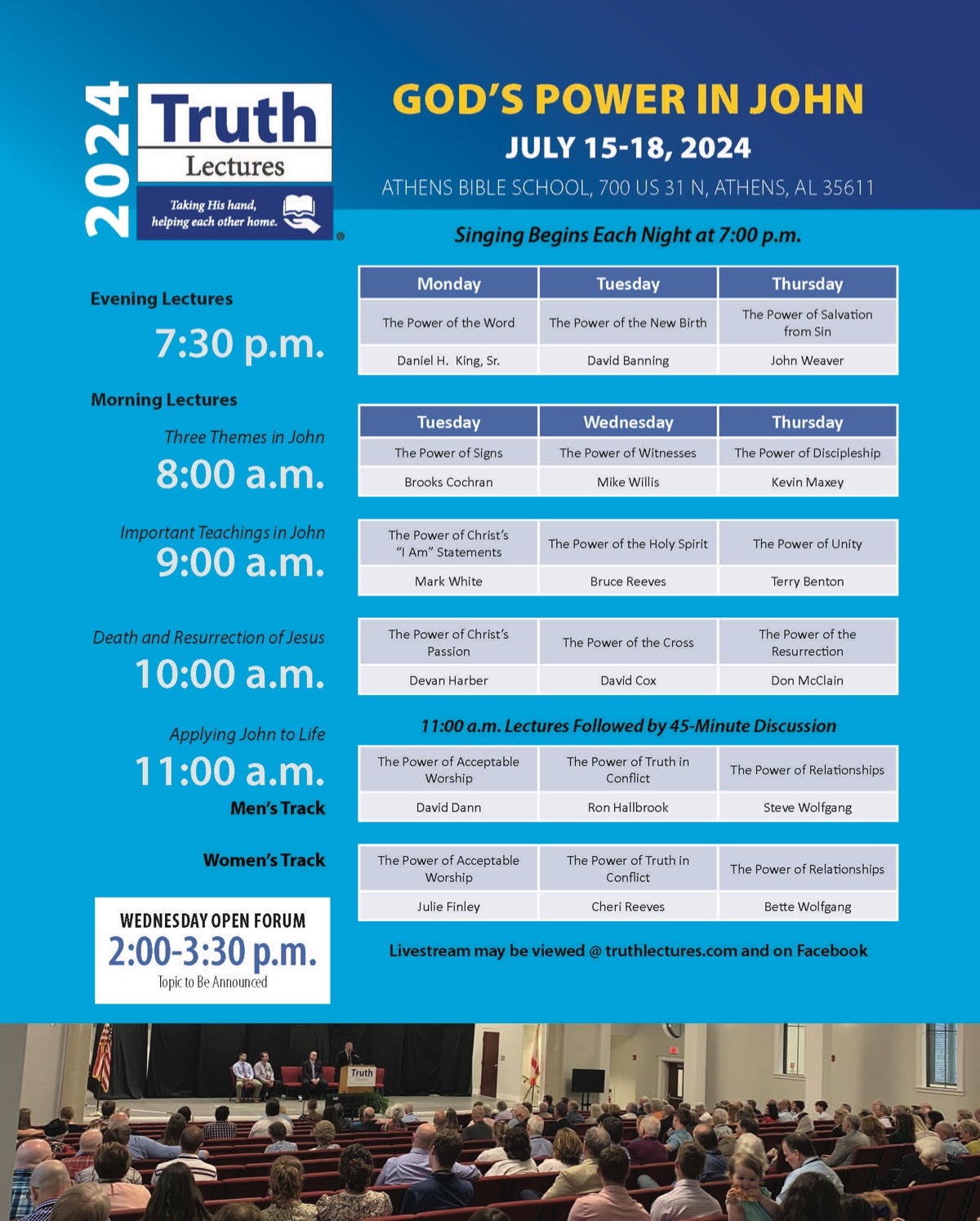
By Shane Carrington
Synopsis: Though we live in an uncertain world, Jesus provides stability and hope for those who “receive a kingdom which cannot be shaken.”
In Sacred Scripture, Mt. Sinai becomes one of the pivotal places that is discussed. It is referred to as “the mountain of God,” and it was a place where God revealed Himself to Moses (Exod. 3) and all of Israel (Exod. 19-20). One of the most momentous events in history occurred there: God thunderously proclaiming the Ten Commandments!
The God of Abraham, Isaac, and Jacob—the great “I AM”—had recently liberated Israel from Egypt. This newfound freedom had incredible implications that would be structured by God’s law and embraced through their service to Him. God graciously gave these ten foundational aspects of His will. He lovingly allowed them into His presence as they approached Him at the foot of the mountain. God protected them from His holiness by keeping them at a safe distance. In all these ways, Mount Sinai became an emblem of God’s presence, a sign of His covenant, and a symbol of His holiness.
Despite these glorious truths, Sinai was located outside of the promised land. Thus, it was only preparatory. That made it a temporary, shakeable symbol (Heb. 12:18-21). Sinai was only a small taste of the mountain we approach: Mount Zion, to which Jesus brings us to today (Heb. 12:22-24). We approach the true promised land and an unshakeable kingdom. As Wright accurately summarized:
You need to come into the promised land (chapters 3 and 4); you need to benefit from the ministry of the true high priest (chapters 5, 6 and 7); you need to realize that you are within the new covenant, where the ultimate sacrifice has already been made, through which you can approach the very presence of God himself (chapters 8, 9 and 10) (Wright, 160-161).
What a gift: that God, through Jesus, made this blessing possible for us! Having such hope assures us while we live in this fallen world.
Therefore, since we receive a kingdom which cannot be shaken, let us show gratitude, by which we may offer to God an acceptable service with reverence and awe (Heb. 12:28).
Through His grace, God gives us the opportunity to serve Him in an acceptable manner. This provides assurance that the world can neither supply nor understand. Consider several related truths that assure us as citizens in God’s spiritual kingdom.
The recent full eclipse that many of us experienced in the heart of our nation provided yet another beautiful demonstration that our great God of heaven is a magnificent Artist. Every sunrise, sunset, and spring-time flower displays His creative genius.
Similarly, the many descriptions of the heavenly fellowship that we enjoy in Christ show His beauty from different—though similar—vantage points. Consider some from this powerful text.
In this passage, “Mount Zion” equals “the city of the living God,” which is also described as “the heavenly Jerusalem” (Heb. 12:22). Just as Jerusalem/Zion was the center of God’s presence in Old Testament Israel, heaven is the focus for us (cf. Heb. 11:10, 15, 16; Ps. 48:1-3). “For here we do not have a lasting city, but we are seeking the city which is to come” (Heb. 13:14). In Jerusalem, they met with God at the temple (which represented His presence among them) to sacrifice to His honor and listen to His word. In New Testament times, through Jesus, we approach heaven itself (cf. Heb. 10:19-22; 4:14-16)!
Through fellowship with God in Christ, we also “come. . . to myriads of angels” (Heb. 12:22), who are celestial servants of God and His people (Heb. 1:6-7, 14).
In Christ, God describes us as “the general assembly and church of the firstborn who are enrolled in heaven” (Heb. 12:23). This references the church in the universal sense, which is the new, true Israel (see Gal. 3:26-29; 6:14-15). The church is God’s spiritual family, born again through Jesus (Gal. 3:26-29). The NASB above describes the church as the “firstborn who are enrolled in heaven.” Every disciple of Jesus is a firstborn child, and their names are written in the Lamb’s book of life (Phil. 4:3; Rev. 3:5; 13:8; 17:8; 20:12, 15; 21:27; cf. Exod. 32:32).
As Christians, we also approach “God, the Judge of all” (Heb. 12:23). Through Christ, “the Son of God” (Heb. 4:14) and our “High Priest” (Heb. 4:15), we can approach Him confidently, yea reverently.
Therefore, let us draw near with confidence to the throne of grace, so that we may receive mercy and find grace to help in time of need (Heb. 4:16).
Thus, we approach the Judge of the universe with godly expectation, not dreadful trepidation! We also “come. . . to the spirits of the righteous made perfect” (Heb. 12:23), which references all the saved of all the ages. The blood of Jesus takes away our sins under the New Covenant, but that same blood also flowed backward from the cross to the ancient worthies who served Him (Heb. 9:15-17). This truth connects the faithful of the Old Testament Scriptures to disciples of Jesus today.
I say to you that many will come from east and west, and recline at the table with Abraham, Isaac and Jacob in the kingdom of heaven; but the sons of the kingdom will be cast out into the outer darkness; in that place there will be weeping and gnashing of teeth (Matt. 8:11-12).
God’s blessings in Jesus abound in everyone who was faithful to God under both covenants.
The climax of this great passage declares how all of this is possible: “Jesus, the mediator of a new covenant” (Heb. 12:24)! His “blood. . . speaks better than the blood of Abel” (Heb. 12:24). Abel’s animal sacrifice, though both acceptable to God and necessary for forgiveness (Gen. 4:4), is inferior to Jesus’s sacrifice. Also, Abel’s own blood (which Cain shed) cried out for justice (Gen. 4:9-15; Heb. 11:4). This contrasts with the blood of Christ, which brings mercy. His shed blood declares Him worthy of our loyal service and reverent worship.
This powerful passage ends with a flurry of distinct depictions. The contrast between the Old and New Testaments includes Sinai versus Zion, Moses versus Jesus, and angels versus Jesus (cf. Heb. 2:1-4). Jesus and His New Covenant are superior to the Old in every way.
For those who reject God’s grace in Jesus, Scripture declares that there will be no “escape” because they “turn away from Him” (Heb. 12:25). In contrast, those who serve God “with reverence and awe” (Heb. 12:28) experience stability, comfort, hope, and peace through Jesus, in whom they put their faith (Heb. 12:27-28).
A somewhat puzzling statement concludes this passage: “for our God is a consuming fire” (Heb. 12:29). Concerning these words, Alexander Purdy suggests:
They carry, to be sure, the note of warning, but the dominant idea is assurance. We who have received the kingdom that cannot be shaken may rest in confident peace, for God is a God who destroys all transient and temporal things in order that what is timeless and unchanging may emerge in full glory; and we are those who have received this permanent home of the soul (Hebrews, 751, as quoted by King, 445).
Fire can consume, demonstrate, vindicate, or refine. May we live for Jesus, so that, as part of His unshakeable kingdom, we will find forgiveness, acceptance, comfort, hope, and peace.
King, Sr., Daniel H. Truth Commentaries: Hebrews. Athens, AL: Truth Publications, 2008.
Wright, Tom. Hebrews for Everyone. Louisville, KY: Westminister John Knox Press, 2004.
Shane Carrington has labored with the Southside church of Christ in Sulphur Springs, TX, since 1999. He has two children. The church website is here. He can be reached here.




By Bobby L. Graham
How far should a Christian go in submitting to the government when the administration in power offers no reverence or acceptable service to God?
One desirous of pleasing God will go just as far as the Bible instructs him to go in submitting to governmental authorities, whether they are good or evil. The Bible clearly teaches such submission, even when rulers fail to reverence God and serve Him. Notice the following passages on this subject:
Let every soul be subject to the governing authorities. For there is no authority except from God, and the authorities that exist are appointed by God. Therefore, whoever resists the authority resists the ordinance of God, and those who resist will bring judgment on themselves. For rulers are not a terror to good works, but to evil. Do you want to be unafraid of the authority? Do what is good, and you will have praise from the same. For he is God’s minister to you for good. But if you do evil, be afraid; for he does not bear the sword in vain; for he is God’s minister, an avenger to execute wrath on him who practices evil. Therefore, you must be subject, not only because of wrath but also for conscience’ sake. For because of this, you also pay taxes, for they are God’s ministers attending continually to this very thing. Render therefore to all their due: taxes to whom taxes are due, customs to whom customs, fear to whom fear, honor to whom honor (Rom. 13:1-7).
Put them in mind to be in subjection to rulers, to authorities. . . (Titus 3:1).
Therefore submit yourselves to every ordinance of man for the Lord’s sake, whether to the king as supreme, nor to governors, as to those who are sent by him for the punishment of evildoers and for the praise of those who do good. For this is the will of God, that by doing good you may put to silence the ignorance of foolish men—as free, yet not using liberty as a cloak for vice, but as bondservants of God. Honor all people. Love the brotherhood. Fear God. Honor the king (1 Pet. 2:13-17).
Observe that submission to duly constituted governmental authority appears in these passages, but it does not rest upon government’s reverence to God. It is true that the passages define the proper functions of government—rewarding and protecting those who do good and punishing, or avenging, those who do evil. Perhaps it is good to recall Jesus’s obedience to the civil powers, even when they were wrongly judging and punishing Him! When Jesus taught concerning government’s persecution of His disciples, there also He taught them to submit, not to resist (Matt. 5:10-12; 10:18-20).
Only in one kind of situation should Christians disobey civil powers: when they require what is evil or forbid what God desires. Then the Lord’s followers will “obey God rather than men” (Acts 5:29). Consider the courageous declaration of Peter and John: “Whether it is right in the sight of God to listen to you more than to God, you judge. For we cannot but speak the things which we have seen and heard” (Acts 4:19).
Bobby L. Graham actively takes part in fill-in preaching, Belize trips, teaching an hour each day at Athens Bible School, and in gospel meeting work. He and his wife, Karen, have three children. He can be reached here.



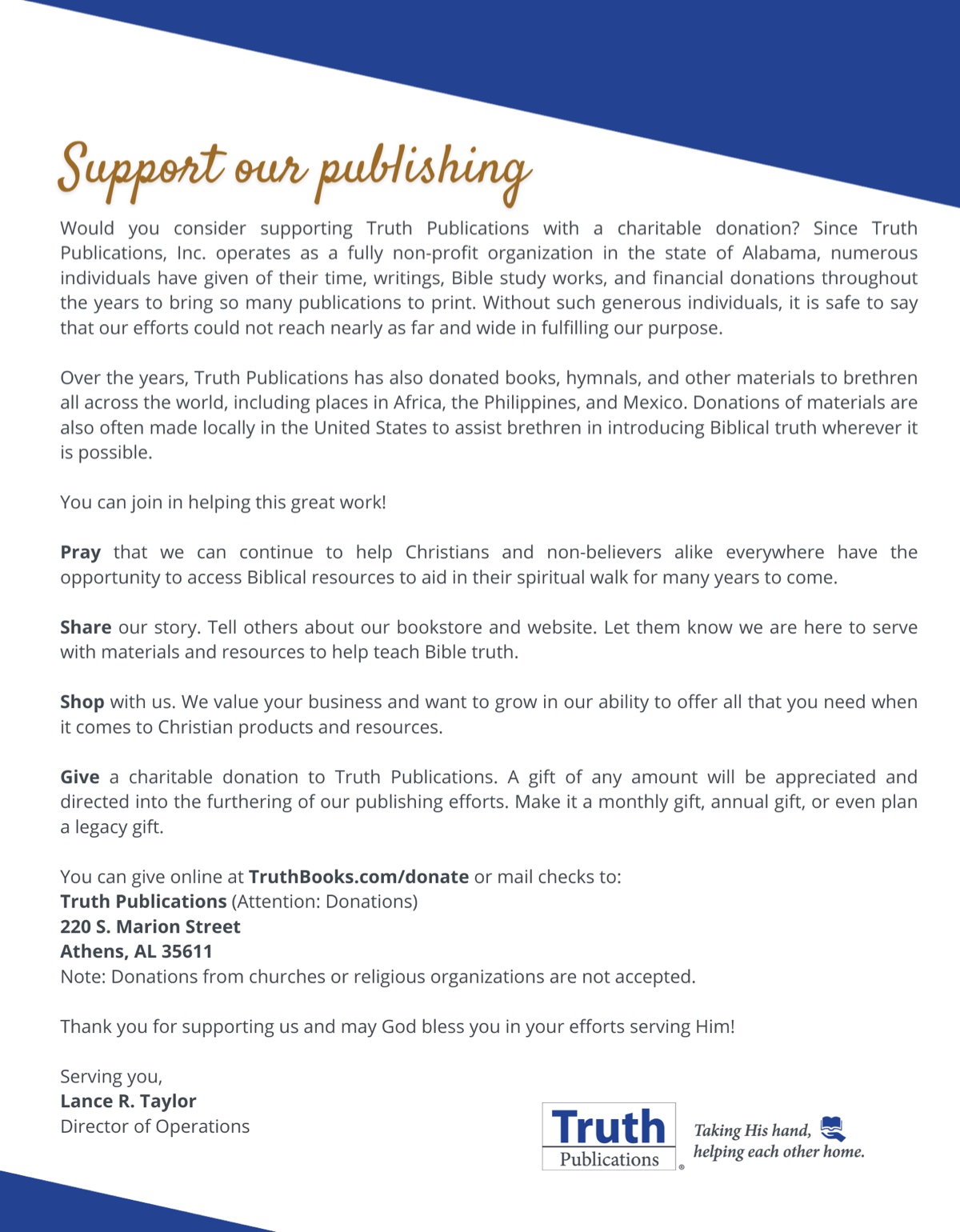
By Luke Chandler
Synopsis: London’s British Museum is famous for its biblical collections, but the nearby Ashmolean Museum holds unique treasures for Bible believers, and is easy to visit.
The British Museum in London is famous for its many biblical artifacts, but there is another museum nearby that is worth a visit for Bible students. The Ashmolean, Oxford University’s own museum, is an easy day-trip from London and has value for any student or teacher of the Bible. It’s also free to visit!
The Ashmolean has a variety of biblically related artifacts including pottery from Jerusalem, a decorated skull from ancient Jericho, shekel weights, an inscribed pottery sherd with an early reference to Passover, a stash of Roman military nails, and a mud-brick stamped with Nebuchadnezzar’s name. Several displays and objects stand out, especially for Bible believers.
Egypt’s pantheon is known for its many gods, but one Pharaoh, for reasons unknown, took a theological turn to monotheism. Akhenaten (also known as Amenhotep IV) closed the traditional Egyptian temples and established a new cult in his capital of Amarna to worship Aten, a single deity represented by a sun-disc. After Akhenaten’s death, Egypt underwent a counter-revolution, canceling Aten and resuming worship to its traditional gods.
The most interesting aspect of Akhenaten’s monotheism may be the timing, since he seems to have reigned just a few decades after Moses. According to the traditional chronology, Moses led the Hebrews out of Egypt in the 1440s BC and Joshua brought them into Canaan around 1400. Akhenaten was born in 1372 and reigned over Egypt from ca. 1353-1336. Does this close timing suggest some temporary, internal challenge to Egypt’s gods after the Exodus events? From where did Akhenaten form his belief in just one god? There is no clear connection between the God of the Hebrews and the Amarna cult, but one naturally wonders about the strength Moses’ influence may have carried.
The Ashmolean has an exhibit dedicated to Akhenaten and his reign in Amarna. Artifacts in the museum depict the king with his famous wife, Nefertiti, and their family. The Amarna period is unique in Egyptian history, and its art has a distinct blue color scheme. Even if we never discern the origin of Akhenaten’s monotheism, the Ashmolean gives us a view of this thought-provoking period.
These jar handles from Hezekiah’s time (ca. 700 BC) are stamped with the Hebrew letters LMLK, an abbreviation for l’melekh which translates as “belonging to the king” and indicates they were government property. These jars were storage vessels that held taxes paid in the form of food products such as olive oil, grain, or wine and are linked to the “storehouses” which Hezekiah built to supply his garrisons against the Assyrian invasion of Sennacherib (2 Chron. 32:27-28). Thousands of these stamped LMLK jar handles have been uncovered in cities throughout biblical Judah, including my archaeological work at the city of Lachish. These handles attest to the widespread defensive program initiated by King Hezekiah.
What did Canaanite idols from the Old Testament period look like? The Bible notes the Israelites struggled to put away idol worship throughout their history, up to the destruction of the kingdom of Judah by Babylon. The Old Testament repeatedly mentions the Asherah goddess when reviewing Israel’s apostasy (1 Kings 18:19; 2 Kings 23:4; Micah 5:14, etc.).
The Ashmolean holds several examples of the fertility goddess, Asherah, showing exactly how the idol appeared. People often worshiped small ceramic figurines of Asherah in their homes as they prayed for the fertility of the ground and the fertility of the womb.
The most intriguing biblical object in the Ashmolean may be a gold Roman coin discovered by a farmer near Oxford in the mid-1800s. The coin was struck around AD 70 and commemorates the Roman destruction of Jerusalem by Vespasian’s son, Titus. The obverse side shows Vespasian as Emperor and the reverse depicts the goddess of Justice with the inscription, “The Justice of the Imperator” (Latin “IVSTITIA IMP”).
The gold for this coin likely came from the Jerusalem temple. After a military campaign, Rome would mint coinage from plundered wealth to pay soldiers their military bonus. Perhaps a legionary who took part in Jerusalem’s destruction was paid with this coin, made of gold that was likely taken from the temple. How did it end up in Britain? In a likely scenario, the soldier was later transferred to Britain before being parted from his coin. Those of us who view this unique treasure in the Ashmolean are likely seeing actual gold from the New Testament temple recast as a Roman coin.
Christians who visit London often see some of the British Museum’s vast biblical collection. The city of Oxford is an easy day-trip and holds its own biblical treasures. Interested in a visit to the Ashmolean? You can tour Oxford University in the morning, walk in the steps of Tolkien or C.S. Lewis in the early afternoon, then enjoy a productive 60 to 90-minute visit at the Ashmolean followed by a first-class High Tea across the street at The Randolph. If you find yourself in England, plan for a day trip to visit Oxford’s Ashmolean Museum.

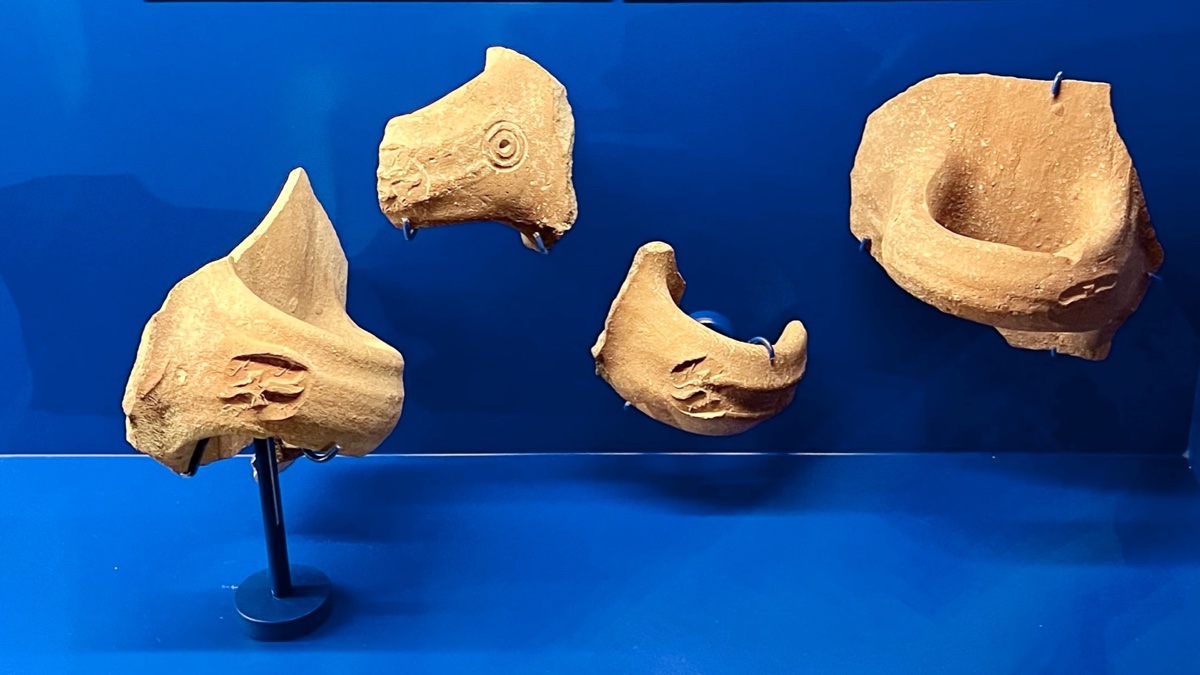

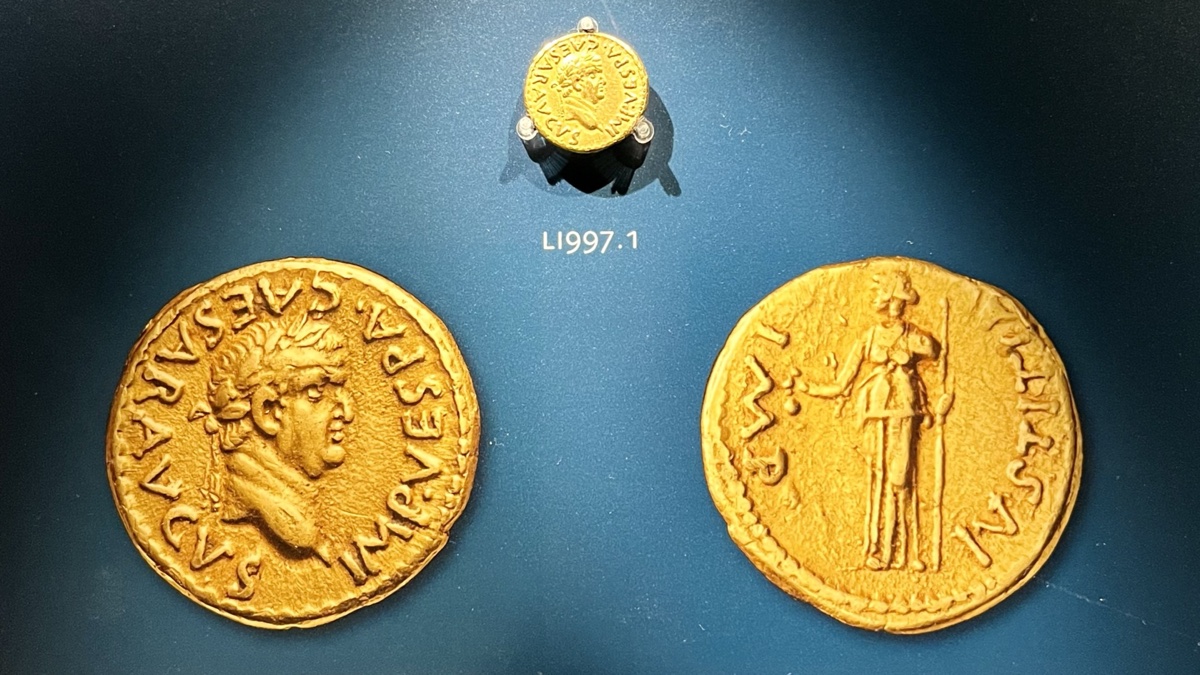
Luke Chandler labors with the North Terrace church of Christ near Tampa, FL. He and his wife, Melanie, have five children. The church website is here. Luke holds an MA in Ancient History and has worked ten archaeological seasons in Israel. His Bible, Archaeology and Travel blog is here. Info about his Travel Tours is here. He can be reached here.



By Chris Reeves
Synopsis: It is important for married couples to learn to be honest and genuine toward themselves and others so that they can be a force for good in the Lord’s church, and not for bad.
It is sad, but true. There are married couples who come into the Lord’s assembly and they are not genuine. They sit together, but they are divided and always fighting. They appear on the outside to be at peace, but in reality, they live in turmoil. The husband may be an elder, a deacon, a preacher, or an “active” member, but he is living in sin. The wife volunteers, teaches the children’s classes, and attends the ladies’ Bible class, but she is living in sin. When asked how they are doing, they say, “We are doing fine,” when, in fact, they are not. They put on a good show for everyone, but the church does not know what really goes on in their hearts or in their home.
The story of Ananias and Sapphira is also a sad one [Note #1]. It is recorded in Acts 5:1-11 and tells of a married couple in the early church who were hypocritically deceitful. Their ungodly example before other church members was so grievous that God struck them dead on the spot. Let’s take a closer look at their behavior and see what we can learn for our marriages today.
Ananias and Sapphira sold a possession and brought a certain part of the money to the apostles for the needy saints (vv. 1-2). This was certainly a good deed, but the problem was, there was a lie behind their good deed. They hoped the church would assume that they were giving it all when, in reality, they were not. Yes, it is possible to do good deeds in the local church, but for the wrong reasons—to gain power, prestige, and position. Married couples should never be a party in doing good with bad motives.
Ananias and Sapphira were in on their lie together. When Ananias kept back part of the price, he did so “with his wife’s full knowledge” (v. 2, NIV, NASV) and with her “consent” (NLT, Weymouth). Their deed was something that they had “agreed together” to do (v. 9, ASV). This couple, like Ahab and Jezebel, worked together to do what was wrong. Did they do so out of “love,” “respect,” or “deference” for the other? I don’t know. Nevertheless, I know that they worked together to do wrong. Married couples today need to “be on the same page” in obedience to God, not in agreeing to do wrong.
Ananias and Sapphira allowed Satan to fill their hearts to lie to the Holy Spirit (v. 3). Just as Judas had done previously (John 13:2), they let Satan enter their hearts. Adam and Eve knew what it was like to let Satan into their marriage and the damage that it causes [Note #2]. Satan did similar damage to Ananias and his wife. Married couples have to work hard to keep Satan out of their marriage. He wants to gain access to our marriages through worldly thoughts and ideas. We must always work hard not to “give place to the devil” (Eph. 4:27). Married couples might want to think about asking each other something like, “Honey, how are you doing with keeping the devil out?”
Ananias and Sapphira let Satan into their hearts (vv. 3-4). They did not keep or guard their heart (i.e., thinking, emotions, and will) with all diligence, as the Proverb writer said to do (Prov. 4:23). Instead, they let their guard down and Satan came over or through the wall of their marriage, as it were, and wreaked havoc. Married couples must always guard what is precious to them—the “heart” of their marriage. God wants your heart, not just your money. Constant vigilance through regular Bible readings together, prayers together, worship together, and good works together will help to guard the hearts of Christian couples.
Ananias and Sapphira lied to the Holy Spirit (v. 3) and they lied to God (v. 4) [Note #3]. They brought a certain amount, implying that they were giving all that they had received, when in fact they had kept back part of it for themselves. Peter said that they were under no obligation to give all the money to the church (v. 4), but they had to be honest and tell the truth. Why did they lie? We are not told. Maybe they wanted the applause, acclaim, and the accolades of the other church members. What we know is that they were fakes and frauds, and Peter called them out for their hypocrisy. You just can’t deceive God. Peter gave them both an opportunity to be honest and “come clean,” but they chose a lie. Married couples today need to do as Paul wrote: “Wherefore, putting away falsehood, speak ye truth each one with his neighbor: for we are members one of another” (Eph. 4:25).
Ananias and Sapphira, by lying about what they were giving, were trying or testing the Spirit of the Lord (v. 9). They were, in effect, testing to see if the Spirit of the Lord, who was in the apostles, really knew all things and could expose their lie. Can the Spirit of the Lord really know what’s in my heart? Can He detect lies, deceit, and hypocrisy in a Christian? Absolutely! Ananias and Sapphira joined a long list of ungodly individuals who tested what was good—individuals like the devil (Matt. 4:1), the Pharisees (Matt. 19:3), and the Old Testament Israelites (Heb. 3:9). Married couples, don’t ever test the Lord. You won’t win that contest!
Not only was this couple dishonest, they also died in a lost condition (vv. 5 & 10) and forfeited their future opportunities to do good for the church and others. Their cover-up did not stay covered up very long, and the divine discipline of death soon followed. In contrast to them, consider Barnabas, what he did, and the good he went on to do, for Paul and others. Ananias and Sapphira were not given such an opportunity for good because of their sinful lives. Married couples today can be such a blessing to God, and to others, if they will simply obey the gospel and live honestly for the Lord each day.
Last, Ananias and Sapphira were a “black eye” on the local church in Jerusalem. They set a bad example for the other church members and for the community. They were the first recorded members to sin since the church began on Pentecost. As a result, God put a stop to their phony charade and “great fear came upon all that heard it” (v. 5, see also v. 11). Sin in the church is a very serious thing to God, and the people in and around Jerusalem soon realized that. Members of the church should live pure lives, or else they will be judged severely. Married couples today die spiritually every time they play the deceit game.
Married couples in the Lord’s church can be a great asset to the Lord and to his brethren if they will only be genuine. Husbands and wives can do much good in the kingdom, but they have to be sincere and unhypocritical. The Lord does not need a phony (a “put on”) in the church, and he does not need someone who has a hidden agenda. He wants brethren who are “unfeigned,” meaning sincere and genuine. Ananias and Sapphira said, “Fake it!” The Lord says, “Be genuine! Be real!” Married couples, let’s all just be honest! Be honest with yourselves, be honest with God, and be honest with all others around you. Let’s all work together for good in the church, never for bad.
The Greek word anupokritos is found six times in the New Testament and it means “unhypocritical” or “unfeigned” (Rom. 12:9; 2 Cor. 6:6; 1 Tim. 1:5; 2 Tim. 1:5; Jas. 3:17; 1 Pet. 1:22). It refers to a Christian who is sincere in mind and behavior and acts without a hidden agenda (selfish motives). What does the Lord want? He wants an unhypocritical and unfeigned love and faith toward Him and the brethren.
Let me encourage all newly married couples to make a habit of being genuine from the beginning of your marriage. Just as you entered your marriage with an innocent spirit of purity, so be innocent and honest in all your dealings with yourselves and with others. Don’t get caught up in the fake, phony, and fraudulent world of Facebook (Fakebook?) where so many people post a “put on” of themselves that is not real or genuine.
Those who have been married and have been in the Lord’s church for some time need to keep being genuine. After you have been a member of the church for many years, it is easy to learn how to “play games” or “play politics” in the local church in order to get what you want. However, you have to resist the urge and temptation to do so.
Those married couples who have lived faithfully with each other for decades—and there are still many—can be such good examples for the church today. You show the Lord’s people that a couple can, in fact, live honestly with each other and for the Lord, in a very deceitful world and without being fake or phony as you do it.
[Note #1] “Ananias” means “Jehovah (the Lord) is gracious” and “Sapphira” (like sapphire, the deep blue gem stone) means “beautiful” or “pleasant.” These two individuals, with their lie, certainly did not live up to their names.
[Note #2] See my article on Adam and Eve in the February 2024 issue of Truth Magazine.
[Note #3] When they lied to the Holy Spirit, they lied to God. This shows that the Holy Spirit is God and deity. The Holy Spirit is one of three members of the Godhead.
Chris Reeves has preached for the Warfield Blvd. church of Christ in Clarksville, TN, since 2016. He and his wife, Cheri, have four children and two grandchildren. His Bible study website is here. The church website is here. He can be reached here.



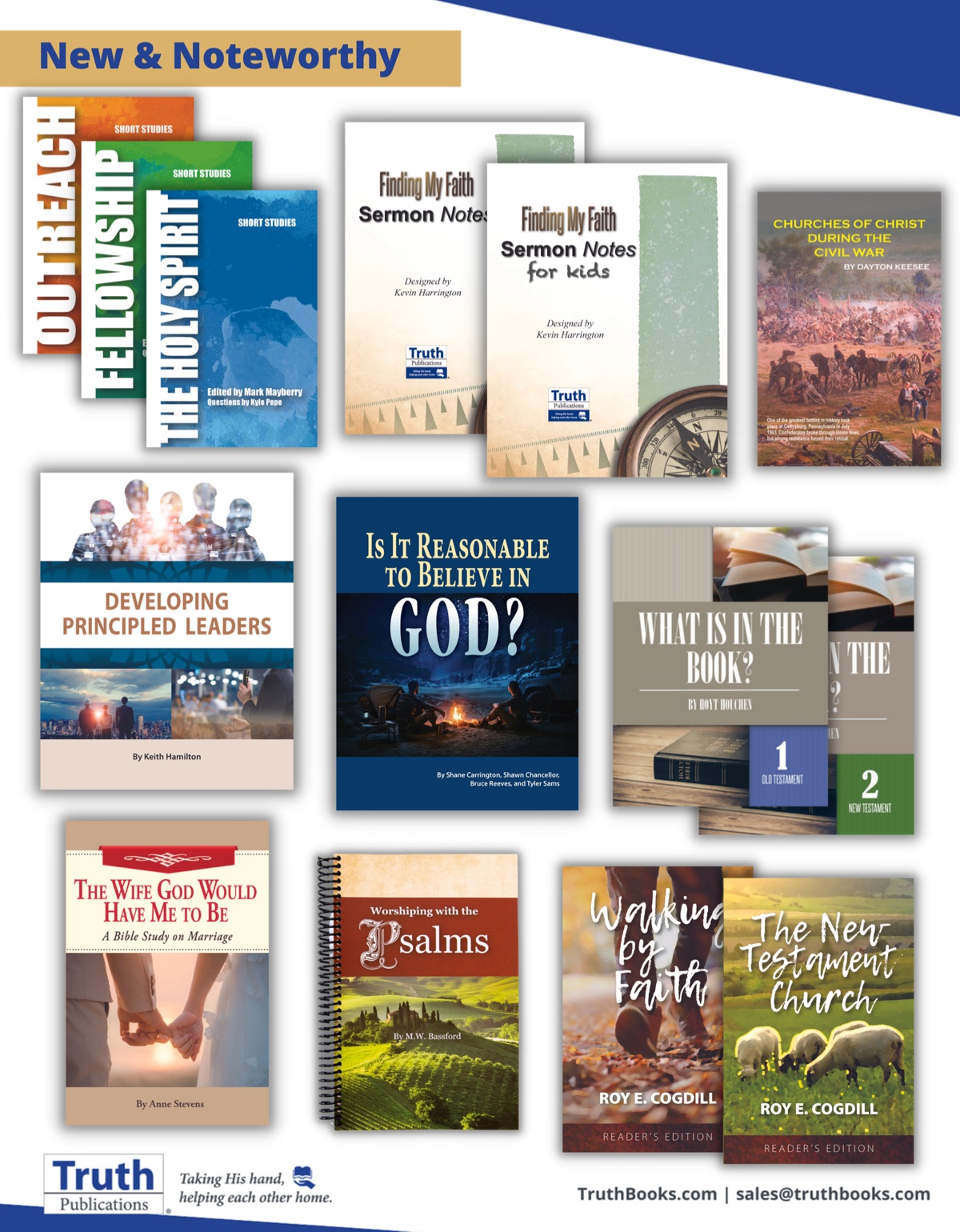
By Danny Linden
Synopsis: Mark 10:35-45 teaches us how and why ambitious disciples need to direct their energies toward service, not self-promotion.
Some people are more ambitious than others, and that’s not necessarily a bad thing. Ambition drives us to push boundaries, grow, and not be satisfied with the status quo. This disposition can lead us to accomplish great things and find success in business, school, and other areas of life. However, ambition can also lead to discontentment, arrogance, and an unhealthy sense of competition that pushes others down. These are incompatible with the Christian walk and are challenges that must be overcome for those who aspire to greatness. Truly, the Bible places more emphasis on living a quiet life and being content (cf. 1 Thess. 4:11; Phil. 2:3; 4:11-13).
Whatever place ambition has in the affairs of this world, it is much less important in the kingdom of God. A conversation in Mark 10:35-45 illustrates how we can manage ambition as Christians and why it works so differently in God’s kingdom.
On one occasion, James and John asked Jesus for a special blessing.
James and John, the sons of Zebedee, came up to Him and said to Him, “Teacher, we want you to do for us whatever we ask of you” And he said to them, “What do you want me to do for you?” And they said to Him, “Grant us to sit, one at your right hand and one at your left, in your glory” (Mark 10:35-37).
Matthew 20:20 includes an additional detail that they had their mother make the request for them, though it is clear that the sons were the ones who were really behind this—Jesus would later direct His response to James and John, not their mother. This also fits their character, as we see in other events that they had a fire within them that, at times, threatened to rage out of control (cf. Luke 9:51-56; Mark 9:38).
The twelve already had many advantages: As a part of Jesus’s inner circle, they had greater access to Him than the other disciples. They traveled with Him from place to place and had opportunities to ask follow-up questions that arose from His teaching (cf. Matt.13:10). The twelve had every reason to believe that their place in Christ’s kingdom was secure. Who were more loyal than they?
However, that was not enough for James and John, and so they made their bold request for positions of highest honor in the kingdom. When Jesus reigned on His throne, they wanted to be right there next to Him—second to no one but Him. Only the “Sons of Thunder” (Mark 3:17) were so brash as to ask for this outright!
As bold as they were, James and John didn’t understand what they were asking. Ambition doesn’t necessarily cover up foolishness or ignorance.
Jesus said to them, “You do not know what you are asking. Are you able to drink the cup that I drink, or to be baptized with the baptism with which I am baptized?” And they said to Him, “We are able.” And Jesus said to them, “The cup that I drink you will drink, and with the baptism with which I am baptized, you will be baptized, but to sit at my right hand or at my left is not mine to grant, but it is for those for whom it has been prepared” (Mark 10:38-40).
The sons of Zebedee fundamentally misunderstood how Jesus would be glorified. They expected Him to ride into Jerusalem and be crowned as king, ushering in a new era of glory for Israel. There was a triumphal entry not long after this (Mark 11), but things got much messier afterwards. Instead of being crowned then and there, a dramatic turn against Jesus was soon to come. He would be arrested and crucified like the worst of criminals. The crowd that shouted, “Hosanna!” would soon scream for Jesus’s blood to be shed.
Ultimately, that would not stop Jesus’s victory. He rose from the dead and established His kingdom—and He now reigns in heaven. James and John needed to know that the path to glory in His kingdom is not easy. Serving Jesus means enduring suffering. Were they ready for it? They said they were, though they probably did not fully comprehend what that meant. Moreover, positions of honor were not doled out like political favors, but reserved for those for whom it has been prepared (Mark 10:40). James and John still did not really understand the kingdom of God.
The brothers’ request obviously incited an argument among the disciples (Mark 10:41). If their indignation had been expressed in modern terms, we might expect to hear: “How dare they jockey for position above us! Who do they think they are?”
Jesus took the opportunity to explain to them what they did not yet understand about His kingdom:
You know that those who are considered rulers of the Gentiles lord it over them, and their great ones exercise authority over them. But it shall not be so among you. But whoever would be great among you must be your servant, and whoever would be first among you must be slave of all. For even the Son of Man came not to be served but to serve, and to give His life as a ransom for many (Mark 10:42-45).
In the kingdoms of the world, ambitious people do whatever it takes to climb to the top. Lying, cheating, and shady dealings are common in our corrupt culture, especially the higher up you go in politics or the corporate ladder. Even worse, when people do attain some power, they often abuse it for their own benefit (cf. Eccl. 4:1-3). It was no different in the first century. The rulers of the Gentiles wielded their power harshly—partly to maintain their power and partly as a perk of the position.
In the kingdom of God, there is no ladder to climb. There is no coveted rank to attain or a better place in heaven to inhabit. Our greatest reward is simply wearing the new name given to us by God (Rev. 2:17). We enjoy fellowship with God now in the church (2 Cor. 13:11) and, to a greater degree, in heaven for eternity (Rev. 21:3-4).
With nowhere positive to direct it, ambition in the church often leads to sin. Diotrephes (3 John 9-10) wanted to be in charge, which led to his “talking wicked nonsense” and excluding fellow disciples who didn’t fall in line with his way of doing things. Others in the present day have displayed a similarly domineering attitude and abused their brethren as a result.
Jesus’s answer to James, John, and every other similarly ambitious disciple is tuned perfectly to the characteristics that make them tick. Ambition creates dynamism and drive, and Jesus simply redirects that zeal to a new purpose. Instead of using your energy egotistically to promote yourself, channel it into service toward others. If you are filled with a burning desire to be above all, lower yourself even further. Give yourself over entirely to the needs of others.
This service cannot be part of a crafty plan to satisfy an ulterior motive—i.e., to trade favors or improve reputation for personal gain. Jesus ended the conversation by using Himself as an example. If anyone had a right to aspire to an exalted position, it was Jesus. Before coming to earth, He reigned in heaven; yet, He deliberately lowered Himself when He became flesh and dwelt among us. He was not concerned with honor and accolades. He didn’t even act like a typical rabbi. Instead, Jesus washed His disciples’ feet, put the needs of others above His own, and became a willing sacrifice for our sins.
Every disciple must learn to humble himself before God. It is enough of a battle to bring your body and mind into subjection to God’s will in all things. However, our lesson in humility doesn’t stop there. There is no competition in the kingdom of God. As long as you are trying to outdo your brethren, you have missed a fundamental difference in how God has structured His kingdom.
One reminder that may make this easier for the more ambitiously minded among us—reaching heaven is the greatest reward to which we could ever attain. We already don’t deserve this and rely on God’s abundant grace to have this hope. What else do we hope to gain by elbowing others out of the way? In the judgment, we will not be concerned with who is ahead of us in line to enter heaven (if that is even a meaningful consideration, which is doubtful). We will be overwhelmed by the glorious presence of God. Since this is how it will be in eternity, shouldn’t we learn to manifest this same spirit of brotherhood and humble submission?
Danny Linden has worked with the Hebron Lane church of Christ in Shepherdsville, KY, since March 2023. He and his wife, Lauren, have four children. The church website is here. His website is here. He can be reached here.




By Tori Willis
Synopsis: Having a lukewarm faith is a sin against God, and this tepid attitude needs to be corrected in order to serve Him effectively.
What is a lukewarm Christian? The suggestion of being lukewarm primarily comes to light in Revelation 3:15-16, which says,
I know your works: you are neither cold nor hot. Would that you were either cold or hot! So, because you are lukewarm, and neither hot nor cold, I will spit you out of my mouth (ESV).
Being lukewarm can involve: (1) Calling ourselves “Christians,” but taking no actions to demonstrate our faith (Jas. 2:14-26); (2) Not actively improving our faith by continuing our learning, being inconsistent in our prayer life, neglecting to read our Bibles, not finding new opportunities to help in our own congregations, etc (1 Pet. 3:15); (3) Not shining our light to others around us; by which we begin to look just like the rest of the world again (Jas. 4:4; Matt. 6:24).
A tepid faith can often be observed in those who simply “grew up in the church,” those who get too busy in their social lives, or Christians who have lost their zeal with the passing years. In short, we begin to “go through the motions.” Instead of “playing church,” young Christians (and those of all ages) need to prepare themselves for the spiritual battles they will face.
Matthew 5:14-16 describes how disciples need to be “lights of the world.” We should openly assist our brethren and those of the world. If we are living like Christ, others will certainly notice. Like light is to darkness, good deeds will be easily identified and appreciated (Prov. 4:18).
We are called to encourage our brethren (Rom. 15:2). In Romans, Paul illustrates how we are to “build up” each other (Rom. 15:2), and notes how he wanted to “strengthen” the Christians in Rome (Rom. 1:11-12). The author of Hebrews describes how we must “stir up” our brethren to do good deeds by regularly assembling with one another (Heb. 10:24-25). Building, strengthening, and stirring are all actions that require movement and effort. Lukewarmness is the opposite of these concepts; encouraging one another takes work, but the lukewarm Christian stays still.
Having an inactive faith prohibits us from being servants. Philippians 2:3-8 discusses the necessity of emptying ourselves of selfish habits and humbly serving our brethren. A primary way is to use the talents or skills that God’s given us (1 Pet 4:10-11); we don’t all have the same talents, but we can use our individual talents for the same cause. Furthermore, being a servant requires one continuously to support and listen to our brethren; this can be described as “bearing one another’s burdens” (Gal. 6:10). Let us live this life for others instead of just living for ourselves.
Christians are called to be soldiers (1 Cor. 16:13). Being a strong soldier requires prior knowledge and assurance of our beliefs, so that we don’t fall into the traps of false teachers or yield to temptation. We need to use God’s word to guide us through the spiritual battlefield (Ps. 119:105). His soldiers may get bruised, but they always get back up due to their armor—God’s armor (Eph. 6:13). However, the lukewarm soldier is no soldier at all; he is a coward who will easily be killed amongst the temptations and challenges of the world. Even though all soldiers are given the same armor, the lukewarm soldier doesn’t utilize it, rendering him useless in the day of battle.
God wants His soldiers to contribute to the work. He commands us to “work heartily” so that we will receive our reward one day (Col. 3:23-24). If we don’t work, there will be no reward—only consequence. Likewise, we must exert qualities such as virtue, knowledge, and self-control to ensure we are being fruitful, just as God desires us to be (2 Pet. 1:5-9). Bearing fruit for God (Rom. 7:4) means that we consistently shine our lights. We are called to contribute by spreading the good news (Matt. 28:19-20; Rom. 10:14-15), defending our faith (1 Pet. 3:15), along with praising and honoring God (John 4:24; Heb. 13:15). These actions magnify the name we wear. We are meant to exemplify God in this world, but if we don’t act like God exists, our faith is pointless to Him.
A Christian’s faith is founded in Jesus’s crucifixion and resurrection. The Bible describes the great suffering our Lord endured on this earth (1 Pet. 2:20-25; Heb. 2:9-10; Isa. 53:3-12). Through Christ’s suffering, we are given the hope of heaven; therefore, we are expected to emulate Jesus in our own lives.
However, lukewarm Christians do not endure through trials as Christ did. When we sin, or simply do nothing, we are saying that Jesus’s sacrifice doesn’t matter. We are supposed to be dead to sin (John 5:24), but lukewarm Christians still live in it, trying to be friends with God and the world at the same time, which is an impossibility (Jas. 4:4).
We are called to be like Christ and show the same dedication as He did; that’s what the name Christian is all about (Eph. 5:2;1 John 2:6; John 13:13-17). If we don’t take the necessary actions and stand up for our faith, we are hypocrites. Consequently, we are no better than people who blatantly do evil (2 Pet. 2:20-22; Titus 1:16; 1 John 2:4). We are not agents of God if we still look like the world.
Acknowledging our individual shortcomings and creating a plan to improve is the first step in overcoming lukewarm attitudes (1 John 1:9; Luke 6:41-42).
Actively growing in our faith through studying the Bible, prayer, and seeking help from other Christians prepares us for future challenges (2 Pet. 3:18; Eph. 6:11). Being lukewarm is a sin of its own, but continuing in a strong faith requires devoted preparation.
Staying connected with other Christians encourages everyone involved; it helps ensure that each of us will continue growing in the faith and doing what is right. Your brethren will want the best for you, and Christians all have the same goal of heaven (Matt. 18:15-20; Eccl. 4:9-12; Prov. 27:17).
From heaven’s perspective, being lukewarm is the same as being openly evil. It’s no different from any other sin, and we will be punished for our actions, or lack thereof (Rev. 3:16).
Without dedication, our faith is worthless. A Christian’s faith must be active. There is no point in believing if we don’t support it with our works (Jas. 2:14-26).
We’ll go to hell if we do not change our ways. Recognizing our faults is important, but changing our habits is what will ensure our receiving the promised prize (Rom. 1:18; 6:28: Rev. 20:15).
We must dedicate our lives to the Lord. To be faithful to our calling, let us be different from the world and grow ever stronger in our faith (Col. 3:1; Eph. 6:16; Phil. 4:8-9; Gal. 2:20).
Tori Willis is a member of the Jamestown church of Christ in Jamestown, IN. She is a student at Western Boone Jr.-Sr. High School. She can be reached here.



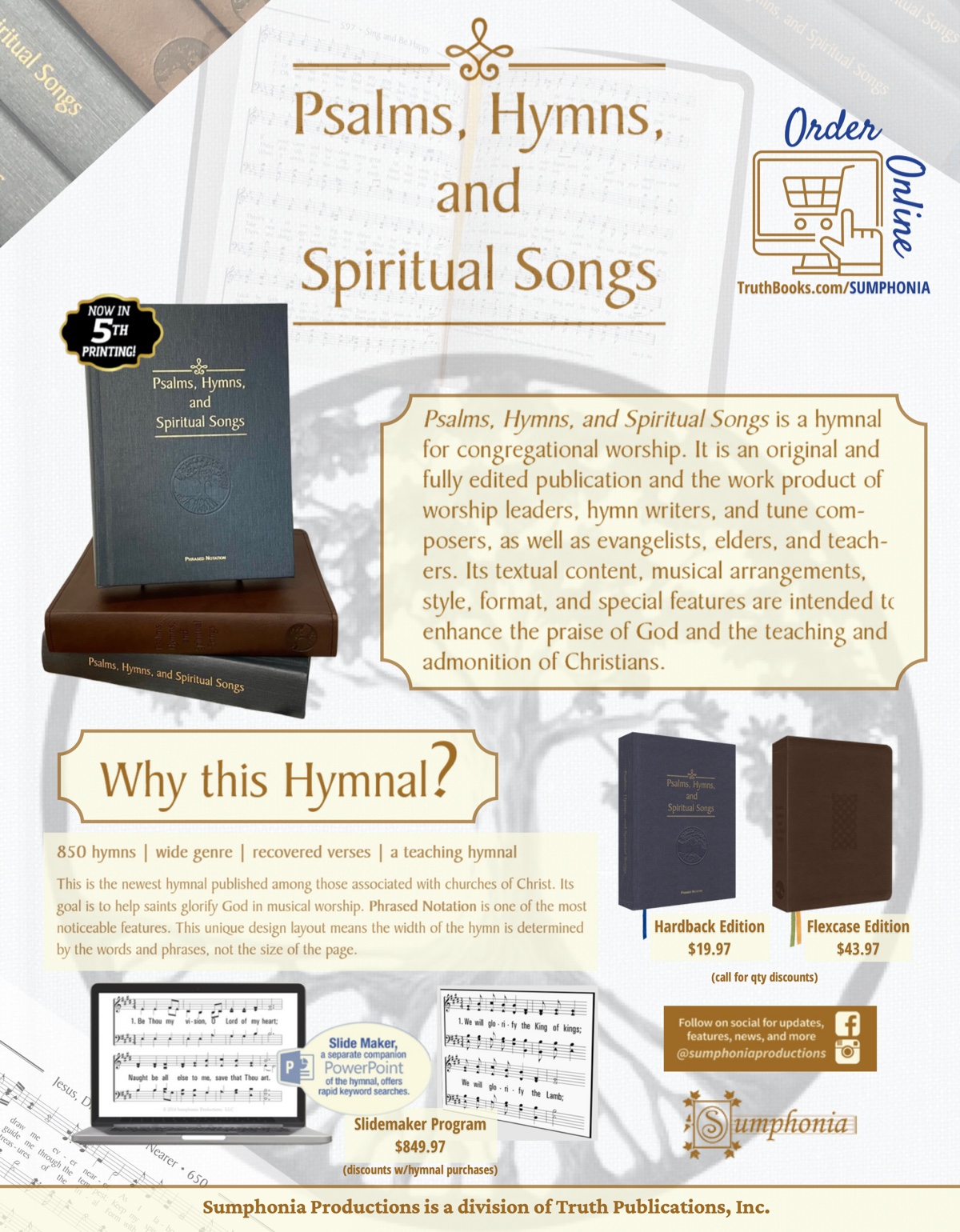

By Joe R. Price
Synopsis: God-pleasing faith is activated and sustained by “the faith” (God’s word).
Jesus said, “Have faith in God” (Mark 11:22). Faith defines us as children of God (Gal. 3:7, 26). It activates the Christian’s attitudes, speech, and actions. We cannot please God without faith.
God-pleasing faith is active in His service and obedient to His will. Obtaining and increasing faith is produced and rooted in the truth of His word (Heb. 11:6, 1; Rom. 10:17; Col. 2:5-7; Jas. 2:14-26). Therefore, God-pleasing faith is not blind, but is built on the sound evidence of truth (John 20:30-31). Faith is genuine, not contrived (2 Tim. 1:5). Faith is chosen, not inherited (John 8:23-24). Faith is defined by whether we trust and obey God, not by how we feel toward Him (Acts 23:1; 26:9; 1 Tim. 1:12-13).
Faith (pistis) “is the assurance of things hoped for, the conviction of things not seen” (Heb. 11:1, ESV). This statement affirms two things about faith: First, faith gives substance (support) to our hope. Without genuine faith, there is no assured hope. Second, faith is evidence that we trust things we have not seen. Faith is not blind, but built upon supporting evidence (John 20:30-31). Faith testifies that we agree with this evidence (John 20:29). Our obedience to the word of God reveals that we are motivated by our trust in God and His word. God-pleasing faith acknowledges God and seeks His will diligently (Heb. 11:6).
Before exhorting Christians to add to their faith diligently, Peter addressed them as those “who have obtained like precious faith with us by the righteousness of our God and Savior Jesus Christ” (2 Pet. 1:1, 5-7). Christians share a “common faith” with the apostles (Titus 1:4; cf. 1 John 1:3-4). Peter said that obtaining (receiving) this faith is “by” means of (the Greek preposition en denotes position and instrumentality) the righteousness of our God and Savior Jesus Christ." Righteousness in this verse does not refer to the character of “our God and Savior Jesus Christ.” Instead, it relates to how a just and righteous God justifies guilty sinners. As Paul affirmed, God is “just and the justifier of the one who has faith in Jesus” (Rom. 3:25-26).
Paul boldly proclaimed,
For I am not ashamed of the gospel of Christ, for it is the power of God to salvation for everyone who believes, for the Jew first and also for the Greek. For in it, the righteousness of God is revealed from faith to faith; as it is written, “The just shall live by faith” (Rom. 1:16-17, NKJV).
The gospel reveals the “righteousness of God” (how sinners are “justified freely by His grace through the redemption that is in Christ Jesus” [Rom. 1:17; 3:21-26]). Sinners are freed from the guilt and penalty of sin “from faith to faith.” The gospel (the “faith,” i.e., the system of faith) produces personal faith (which is “accounted for righteousness” [Rom. 4:5, 22]). Thus, God’s means of justifying sinners is “from faith to faith.”
The power of God that saves us is revealed in the gospel (“the faith,” a system, arrangement, scheme, or structure) through which we obtain personal faith when we hear, believe, and obey “the faith.” Let us further explore “the faith” from God’s word.
The gospel is “the faith” that produces personal faith. A series of synonyms is used in Acts 13:5-12 which are equivalent to “the faith” (the word of God, the faith, all righteousness, the straight ways of the Lord, and the teachings of the Lord). The conclusion is evident that “the faith” is God’s word (the Lord’s teachings, the gospel). In Galatians 1:11 and 23, the apostle Paul used “the gospel” and “the faith” interchangeably for the message he preached. When we preach the gospel, we preach the faith (i.e., the “word of faith,” Rom. 10:8; cf. Heb. 1:2).
God delivered the faith (the gospel) from heaven to humanity, so that we may have personal faith that pleases Him. The faith must be preached (Gal. 1:23; Acts 24:24; Rom. 10:8), heard (Gal. 3:2; Rom. 10:14), believed (Acts 13:12; Rom. 10:9-10, 14), obeyed (Acts 6:7; Rom. 1:5; 16:26; 10:8, 16-17), contended for (Jude 3), and continued in (Acts 14:22; Col. 1:22-23) to have God’s blessings of salvation and eternal life in Christ. Personal faith that is not activated and sustained by “the faith” (God’s word) is not faith that pleases God.
It has been said that faith takes God at His word and does whatever He says. Put another way, faith that saves is faith that obeys. Indeed, Christ is “the author of eternal salvation to all who obey Him” (Heb. 5:9). It is foolish and futile to separate God-pleasing faith from obedience. Jesus emphatically questioned those who claim Him as Lord yet fail to do what He says (Luke 6:46). Unfortunately, some appear convinced that faithfully obeying Christ’s word potentially robs Christians of their assurance and hope in the Son of God. Yet, abiding in the word of Christ is the essence of discipleship, love, and fellowship with the Lord (John 8:31-32; 14:21, 23-24). We stand in God’s grace by faith (that obeys Jesus), and thus, we “rejoice in hope of the glory of God” (Rom. 5:2). What blessed assurance is ours when we trust and obey the faith—the gospel of Christ!
The apostle Peter encourages Christians to diligently “add to your faith” (2 Pet. 1:5). Diligently increasing our faith makes our “call and election sure,” prevents stumbling, and assures our entrance into the everlasting kingdom (2 Pet. 1:10-11).
After Christ warned against becoming a stumbling block by failing to forgive thoroughly and repeatedly those who sin against us, His apostles said to the Lord, “Increase our faith” (Luke 17:5). It takes strong faith to forgive those who sin against us. Significantly, Jesus explained that each disciple is responsible for increasing his faith. Christ does not miraculously or mysteriously increase our faith for us. We must actively pursue the growth of our faith in Him (2 Pet. 1:5-7). The active pursuit of increased faith is emphasized in Christ’s reply to the apostles’ urgent request for greater faith (Luke 17:6-10).
Jesus taught that we must do certain things to increase our faith. We must:
Faith is not a sign of weakness, but of reliance on the strength of the Lord. Faith trusts God to work in us as we trust and follow His word. When a lost soul obeys the Lord in baptism, he trusts (puts his faith in) the working (energy, power, strength, operation) of God to cut away his past sins (Col. 2:11-12). Then, God continues to work in the Christian who obeys Him (Phil. 2:12-13). The mustard seed of faith grows when our faith hears and follows the word of His grace (Acts 20:32). The power of faith is found in doing God’s will, not merely saying we believe (Matt. 7:21-23). We trust the power of faith when we do His will. God’s power works in us as we faithfully obey His word (Eph. 3:20).
Just as a slave serves at the pleasure of his master, disciples of Christ willingly offer themselves to do our Master’s bidding. The servant does not please himself by putting himself before the desires of his master. Likewise, we increase our faith by putting the Lord’s will before our own. Faith serves when the Master calls. Faith listens to Christ’s word and faithfully serves Him. Faith is about honoring and serving our Master rather than ourselves. Faith in God grows as we serve Christ and others according to His revealed will.
When a servant obeys his master, he has done nothing more than what is expected. Likewise, when disciples of Christ “have done all those things which [they] are commanded should say, ‘We are unprofitable servants. We have done what was our duty to do’” (v. 10). When we obey Jesus, we have not earned anything; We have merely done our duty. That is what faith requires (cf. Micah 6:8; Matt. 7:21-23).
Jesus explained that to increase our faith, we must actively respond to the Master’s will. Faith in Christ compels us to serve His will and do our duty. On the other hand, inactive faith does not increase but withers away.
Consider Noah’s faith as an example to follow (Heb. 11:7). By faith, he built an ark as God commanded (Gen. 6:14-16). Noah’s obedient faith did not earn God’s grace; rather, it met the condition God set for him and his household to be saved from the flood. Because Noah faithfully obeyed God, he became an “heir of the righteousness which is according to faith” (Heb. 11:7; Gen. 6:8-9, 22). Noah’s faithful obedience exemplifies the personal faith we are called to have to be saved by and stand in God’s grace (Titus 3:4-5; Mark 16:15-16; Acts 2:37-42).
Faith gives and sustains life from the death of sin (Rom. 1:17; Heb. 10:36-38). As Christians walk by faith, they do not shrink from faith’s challenges and trials because doing so leads to destruction (Heb. 10:32-36, 39). Instead, may our faith endure every trial by trusting and following the word of Jesus Christ, our Lord. Such trust and obedient endurance is the faith that saves and preserves our souls (Heb. 10:37-39).
Joe Price has preached the gospel for forty-six years and has worked with the Vegas Drive church of Christ, Las Vegas, NV, since October 2022. He also makes annual preaching trips to India. His teaching material is available online here, here, and here. He can be reached here.



By Mark Mayberry
Synopsis: While the concept of moral excellence (Greek: aretē) was highly valued in the Greco-Roman world, its application was limited to military valor or civic virtue. In contrast, the New Testament emphasizes the excellence that the righteous are to maintain in life and death.
The English word “excellence” refers to “the quality of being excellent,” i.e., “superior” or “very good of its kind” (Webster).
Skimming through quotes on excellence posted to GoodReads.com, the following ones resonated with me:
If a man is called to be a street sweeper, he should sweep streets even as a Michaelangelo painted, or Beethoven composed music, or Shakespeare wrote poetry. He should sweep streets so well that all the hosts of heaven and earth will pause to say, “Here lived a great street sweeper who did his job well”—Martin Luther King, Jr.
My meaning simply is, that whatever I have tried to do in life, I have tried with all my heart to do well; that whatever I have devoted myself to, I have devoted myself to completely; that in great aims and in small, I have always been thoroughly in earnest—Charles Dickens, famous English novelist, who wrote David Copperfield, Tale of Two Cities, and A Christmas Carol.
Perfection is not attainable, but if we chase perfection, we can catch excellence—Vince Lombardi, legendary coach of the Green Bay Packers.
If you don’t have time to do it right, when will you have the time to do it over?—John Wooden, the “Wizard of Westwood,” who won ten NCAA national championships in a 12-year period as head coach for the UCLA Bruins, including a record seven in a row.
In the New Testament, the Greek word aretē and its related word family express the idea of moral excellence or virtue.
The Greek word aretē refers to “moral goodness, i.e. virtue” (Thomas, 703).
Arndt says that this has a long history of usage. Homer used the term to denote “consummate ‘excellence’ or ‘merit’ within a social context. . . Exhibition of aretē invites recognition, resulting in renown or glory. In Homer, [it is used] primarily of military valor or exploits, [and] also of distinction for other personal qualities and associated performance that enhance the common interest. . . In biblical usage, it refers to (1) uncommon character worthy of praise, excellence of character, exceptional civic virtue; (2) manifestation of divine power, miracle (a usage in keeping with the primary meaning)” (BDAG, 130).
In the NASB, this word occurs five times in four Bible verses (Phil. 4:8; 1 Pet. 2:9; 2 Pet. 1:3, 5 [2x]).
Finally, brethren, whatever is true, whatever is honorable, whatever is right, whatever is pure, whatever is lovely, whatever is of good repute, if there is any excellence and if anything worthy of praise, dwell on these things (Phil. 4:8).
But you are A CHOSEN RACE, A royal PRIESTHOOD, A HOLY NATION, A PEOPLE FOR God’s OWN POSSESSION, so that you may proclaim the excellencies of Him who has called you out of darkness into His marvelous light; for you once were NOT A PEOPLE, but now you are THE PEOPLE OF GOD; you had NOT RECEIVED MERCY, but now you have RECEIVED MERCY (1 Pet. 2:9-10).
Grace and peace be multiplied to you in the knowledge of God and of Jesus our Lord; seeing that His divine power has granted to us everything pertaining to life and godliness, through the true knowledge of Him who called us by His own glory and excellence (2 Pet. 1:2-3).
Now for this very reason also, applying all diligence, in your faith supply moral excellence, and in your moral excellence, knowledge, and in your knowledge, self-control, and in your self-control, perseverance, and in your perseverance, godliness, and in your godliness, brotherly kindness, and in your brotherly kindness, love (2 Pet. 1:5-7).
In summary, “In its original classical usage aretē denoted either the quality of excellence (in any sphere) or the renown that such excellence duly receives” (ISBE). In other words, virtue is that quality that causes us to act accountably and responsibly. It challenges us to be and do our best.
Virtue carries the idea of initiative and energetic action. This describes the person who does not sit back and wait for things to be done. Instead, he diligently strives to accomplish his goals. Such initiative comes not so much from physical strength as from an inner spirit that carries one unrelentingly toward a goal. This attitude should be manifested by New Testament Christians (John 9:4; 1 Cor. 9:24; Phil. 3:11-15; etc.).
We must work the works of Him who sent Me as long as it is day; night is coming when no one can work. While I am in the world, I am the Light of the world (John 9:4-5).
Do you not know that those who run in a race all run, but only one receives the prize? Run in such a way that you may win (1 Cor. 9:24).
. . .Not that I have already obtained it [i.e., the resurrection from the dead] or have already become perfect, but I press on so that I may lay hold of that for which also I was laid hold of by Christ Jesus. Brethren, I do not regard myself as having laid hold of it yet; but one thing I do: forgetting what lies behind and reaching forward to what lies ahead, I press on toward the goal for the prize of the upward call of God in Christ Jesus. Let us therefore, as many as are perfect, have this attitude; and if in anything you have a different attitude, God will reveal that also to you (Phil. 3:11-15).
Virtue carries the idea of steadfastness and consistency. This describes the person who decides without wavering. Indecisive people never quite make decisions that are final, but constantly change their mind (1 Kings 18:17-24, esp. v. 21; Luke 9:62). One who is steadfast, consistent and decisive will not be faithless or fickle; rather, his decisions will be firm and fixed.
Elijah came near to all the people and said, “How long will you hesitate between two opinions? If the LORD is God, follow Him; but if Baal, follow him.” But the people did not answer him a word (1 Kings 18:21).
But Jesus said to him, “No one, after putting his hand to the plow and looking back, is fit for the kingdom of God” (Luke 9:62).
Virtue carries the idea of courage to do what is right. This describes the person who does not give in to peer pressure (1 Cor. 15:29-34).
Otherwise, what will those do who are baptized for the dead? If the dead are not raised at all, why then are they baptized for them? Why are we also in danger every hour? I affirm, brethren, by the boasting in you which I have in Christ Jesus our Lord, I die daily. If from human motives I fought with wild beasts at Ephesus, what does it profit me? If the dead are not raised, LET US EAT AND DRINK, FOR TOMORROW WE DIE. Do not be deceived: “Bad company corrupts good morals.” Become sober-minded as you ought, and stop sinning; for some have no knowledge of God. I speak this to your shame (1 Cor. 15:29-34).
A courageous person has the strength of his convictions. He stands firm, regardless of the danger or difficulty. He will do what is right, despite threats of physical harm, loss of friends, or the sacrifice of position, property, or prestige. This attitude should be manifested by all who faithfully serve the Lord (Acts 5:17-32, esp. v. 29; 2 Tim. 1:6-8).
But Peter and the apostles answered, "We must obey God rather than men (Acts 5:29).
For this reason, I remind you to kindle afresh the gift of God which is in you through the laying on of my hands. For God has not given us a spirit of timidity, but of power and love and discipline. Therefore, do not be ashamed of the testimony of our Lord or of me His prisoner, but join with me in suffering for the gospel according to the power of God (2 Tim. 1:6-8).
He Was Loved. As the eleventh son of Jacob/Israel, and the firstborn of Rachel, Joseph was loved more than all his older brothers (Gen. 37:3-4). In contrast with the partiality and pettiness of men, God’s love is manifested for all humanity (John 3:16; 1 John 4:7-11).
He Was Faithful. Joseph faithfully reported to his father, Jacob, on the welfare of his brothers and the flocks, even when the news was bad (Gen. 37:2, 12-17). In like manner, we must be faithful and accurate in all our communication, even if it means we must stand against the majority (Exod. 23:2-3; Eph. 4:25).
He Was Forsaken. Through no apparent fault of his own, Joseph was hated and forsaken by his brothers (Gen. 37:18-36; cf. 42:21-22). Yet, despite being forsaken by men, may we always remember that God is faithful (Ps. 22:1-5, 22-26).
He Was Forgiving. Yet, despite the mistreatment to which he was subjected, Joseph was forgiving (Gen. 42:21-24; 45:1-15; 50:15-21). In like manner, we must also manifest a heart of forgiveness (Matt. 18:23-35; Luke 17:3-4).
He Was Faithful to God. Joseph faithfully related his dreams/visions (Gen. 37:5-11; Num. 12:6). Although God no longer communicates through dreams and visions (Heb. 1:1-2), like Joseph, we must faithfully relate God’s revelation accurately—without addition, subtraction, or alteration (Jer. 23:25-32), and humbly—by drawing attention, not to himself as the messenger, but to the divinely inspired message (Gen. 41:14-16).
He Was Faithful to Man. Joseph was faithful to Potiphar (Gen. 39) and Pharaoh (Gen. 39:21-23). Joseph manifested virtue when he refused to commit adultery with Potiphar’s wife (Gen. 39:6-12). In like manner, so must we be also (Luke 12:42-43).
As Joseph was faithful as an heir of God’s promise, and we must be also (Gen. 50:22-26; Heb. 11:13-16). Will we be faithful to God’s eternal plan and purpose?
Ruth demonstrated loyalty (Ruth 1:16-17). So also should we (Prov. 20:6-7; 21:21; Hos. 6:4-11). She demonstrated diligence (Ruth 2:1-3). So also should we (Deut. 28:1-3; Prov. 12:24; Eccl. 9:10). She demonstrated discretion (Ruth 3:1-5). So also should we (Prov. 1:1-7; Titus 2:3-5; 1 Pet. 3:1-4). She demonstrated patience (Ruth 3:16-18). So also should we (Ps. 27:11-14; 37:7-11; Heb. 10:35-39).
Those who seek the praises of God are worthy of commendation. Their lives demonstrate the quality of virtue: moral excellence, moral character, moral goodness. However, those who merely seek the praise of men are unworthy of true praise (Matt. 6:2, 5; 23:5-7; John 5:44).
Finally, brethren, let us encourage excellence in the teaching and preaching of God’s word. As John Stott reminds us,
It is an enormous privilege to be called to preach in the contemporary world, and to be a biblical expositor! For one then stands in the pulpit, with God’s Word in his hands, God’s Spirit in his heart, God’s people before his eyes, waiting expectantly for God’s voice to be heard and obeyed.
Mayhue adds, “With this great privilege comes an equally important responsibility. We all need to carry out our sacred duty to exposition at the highest level of excellence, an excellence that extends even to our introductions, illustrations, and conclusions” (Mayhue, 254).
Someone once said that aretē described the quality a commanding officer most desired in his own men, and most feared in the enemy. God wants us to “Act like men!” (1 Cor. 16:13).
In the New Testament, manliness is patterned after the type introduced by Jesus Christ. This is different from the Greek or Roman concept of manliness that glorified physical strength above other qualities. Instead, it refers to one who seeks moral excellence by walking in the steps of Jesus!
Be on the alert, stand firm in the faith, act like men, be strong (1 Cor. 16:13).
Arndt, William, et al. A Greek-English Lexicon of the New Testament and Other Early Christian Literature (BDAG). Chicago, IL: University of Chicago Press, 2000.
Donaldson, T. L. “Virtue,” in The International Standard Bible Encyclopedia, Revised. Edited by Geoffrey W. Bromiley. Grand Rapids, MI: Wm. B. Eerdmans, 1979-1988.
“Excellence Quotes on GoodReads.” GoodReads.com. Accessed April 14, 2024. https://www.goodreads.com/quotes/tag/excellence?page=1.
Mayhue, Richard L. “Introductions, Illustrations, and Conclusions,” in Rediscovering Expository Preaching Dallas, TX: Word Publishing, 1992.
Merriam-Webster’s Collegiate Dictionary. Springfield, MA: Merriam-Webster, 1996.
Stott, John R. W. “Christian Preaching in the Contemporary World,” Bibliotheca Sacra 145, no. 580 (October–December 1988): 370.
Thomas, Robert L. New American Standard Hebrew-Aramaic and Greek Dictionaries: Updated Edition. Anaheim, CA: Foundation Publications, Inc., 1998.
Mark Mayberry has labored with the Adoue Street church of Christ in Alvin, TX, since 1998, where he serves as the evangelist and an elder. The church website is here. His website is here. He can be reached here.


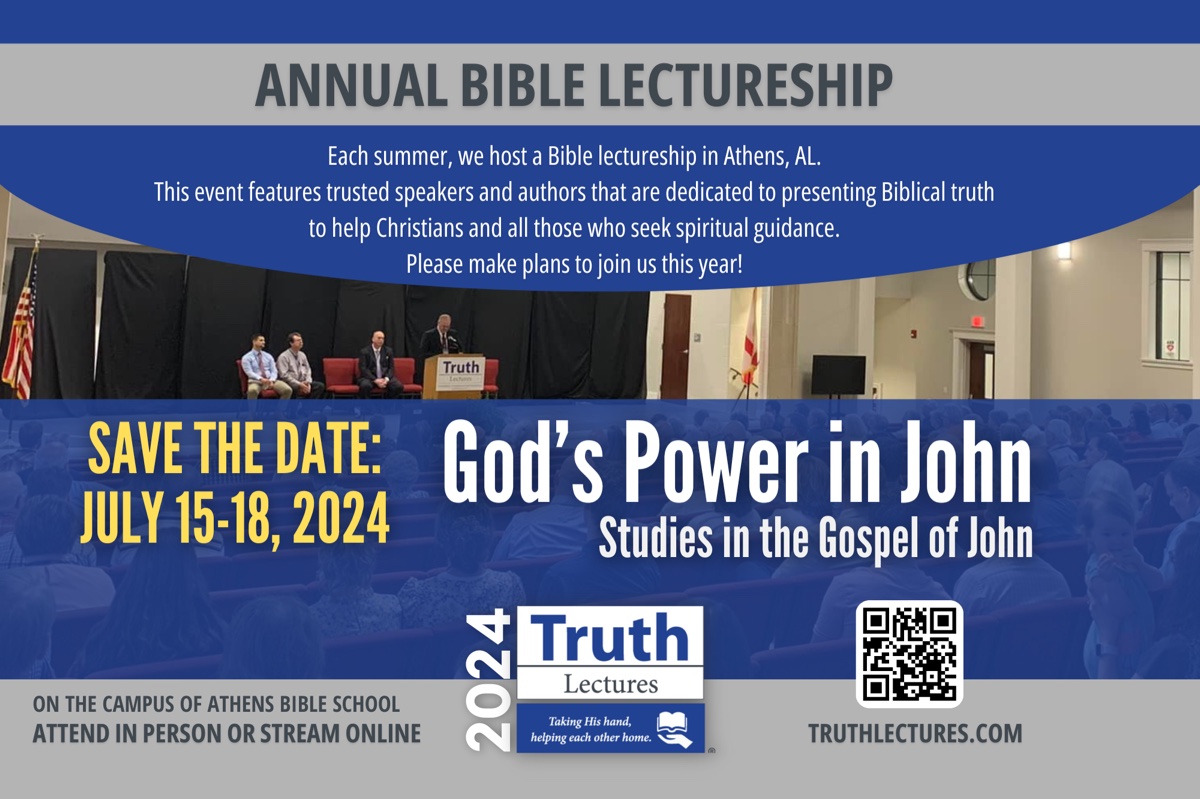
By Jeff Wilson
Synopsis: Growth is knowledge—and its applied form of discernment—is both possible and necessary in the Christian life.
Like Paul, the apostle Peter wrote a last letter in the consciousness that his time in this world was near the end and death was near. There were things of which Christians needed to be reminded (1:12; 3:1).
The environment that Peter seems to be addressing in his second letter was one of doctrinal confusion (particularly regarding the second coming), moral libertinism, and a lack of interest—or even a sense of need—in personal spiritual growth. This particular combination of spiritual deficits made the Christians who received this letter ripe for the false teaching of the errorists in Peter’s sights.
The amount of space Peter gives to describing both the error and the character of false teachers is an important part of the larger context of what Peter is saying in 1:5-7. The end of that list both encourages Christians that these things will keep them from being unproductive and unfruitful, and also warns them that the lack of these things will render them so nearsighted as to be blind, having lost sight of that from which they were saved. This becomes all the more clear when, in 2:20, Peter notes that the false teachers themselves had previously escaped the world of sin “through the knowledge of our Lord and Savior Jesus Christ.” Among the various virtues that the inspired apostle lists in 2 Peter 1:5-7, knowledge is one that is desperately needed in our age.
In the sentimental and therapeutic age in which we live, we are much more prone to focus on attitudes and emotions than we are on knowledge, clear thinking, and wise discernment. It is far easier to blame the person who caused our anger (or any other negative emotion) than to ask whether the problem is ourselves—are we right to be angry (Jonah 4:4)? Yet Peter squarely puts knowledge on his list of items in which we need to be constantly increasing.
Contextually, one can make the case for knowledge here to be taken either as the awareness of certain objective facts, or the ability to discern correctly on the basis of objective knowledge—what we often call wisdom and/or understanding. The truth is, the audience to whom Peter is writing already had a significant amount of knowledge—they were already Christians and Peter even admits that he is merely stimulating their memories of truths that they had already learned (cf. 2 Pet. 1:2-3, 12-13, 15; 3:1).
Knowledge and right discernment are needed as indispensable checks to rightly shaping our reflexive emotions and habitual attitudes. Truthfully, we desperately need growth in both areas.
Elsewhere in Paul’s writing—and through Sacred Scripture—the relationship between knowledge and wisdom/discernment is made explicit. For instance, in Colossians 1:9, Paul writes that he prays that those Christians “may be filled with the knowledge of His will in all spiritual wisdom and understanding.” This line makes it easy to see that the end of knowledge is the right application of it to daily life, an application made possible by wisdom and understanding. Knowledge as bare facts is powerless if it does not impact our hearts, decisions, desires, and actions.
In Romans 12:2, while knowledge itself is not explicitly mentioned, Paul does show us how important knowledge applied is—what we could otherwise call wisdom, discernment, or understanding—when he writes, “Do not be conformed to this world, but be transformed by the renewal of your mind, that by testing you may discern what is the will of God, what is good and acceptable and perfect” (ESV). Here we can see that the goal of renewing or transforming our minds is developing the ability to discern the will of God. If we do not develop this ability, Paul implies, we risk being conformed to the world. Implicitly, this is exactly the risk that the audience of 2 Peter is running if they fail to grow in these various graces—including knowledge.
Finally, there is also the Old Testament background to the connection between knowledge and discernment. This is most clearly seen in the verses at the beginning of Proverbs:
To know wisdom and instruction, to understand words of insight, to receive instruction in wise dealing, in righteousness, justice, and equity; to give prudence to the simple, knowledge and discretion to the youth—Let the wise hear and increase in learning, and the one who understands obtain guidance, to understand a proverb and a saying, the words of the wise and their riddles. The fear of the Lord is the beginning of knowledge; fools despise wisdom and instruction (1:2-7).
In the various parallels of this section, one sees that part of knowledge is wisdom, understanding, and discretion. Without these things, there is no point to having for knowledge, for without the mental tools to apply knowledge rightly, it becomes a merely interesting artifact, a body of trivia with no ability to impact that actual living of life rightly before God.
While knowledge-as-facts can be gained rather quickly—by reading or memorizing—knowledge as discernment takes time. All of this must be done intentionally—it must be the goal of the one who needs to grow in this area. Again, the Old Testament book of Proverbs makes this explicit:
My son, if you receive my words and treasure up my commandments with you, making your ear attentive to wisdom and inclining your heart to understanding; yes, if you call out for insight and raise your voice for understanding, if you seek it like silver and search for it as for hidden treasures, then you will understand the fear of the Lord and find the knowledge of God (2:1-5).
In fact, as verse five here implies, a true comprehension of the knowledge of God is not the mere possession of facts and ideas, but the ability to understand them as well.
Thus Peter’s admonition at the beginning of 2 Peter makes all the more sense—and explains why knowledge is in Peter’s list of things in which believers must grow—if they are to be fruitful in God’s kingdom, resist temptation, and avoid being conned by false teachers inculcating worldly values and desires.
The takeaway for the people of God today is that we need to recommit ourselves to be people who know Scripture inside and out. The growth in discernment and understanding that we need can only happen with the right building blocks in place: we must know the objective, revealed truth of God. Without the limiting guidance of God’s word, our wisdom will always devolve into the worldly sort.
We also need to remember that we must have discernment in using Scripture correctly. It is fascinating that in this same letter—at the end—Peter reminds his audience that Scripture can be misused. Peter warns of Paul’s scriptural writing that “[t]here are some things in them that are hard to understand, which the ignorant and unstable twist to their own destruction, as they do the other Scriptures” (3:16). It is easy to baptize the world’s beliefs, desires, philosophies, and practices into apparent legitimacy with twisted Scripture and misapplied principles. It is easy to use “love your neighbor” as a blanket permission to tolerate and permit all manner of ungodliness. Given that the false teachers about whom Peter warns were apparently former Christians who had fallen away (2:20-22), this may have been part of their own approach to apostasy.
Finally, we should also learn from Peter that certain knowledge is possible. In fact, it is an absolute necessity—otherwise our spiritual safety is at stake. The faux-piety that makes doubt a virtue and uncertainty a mark of spiritual humility is not biblical Christianity. Rather, it is quite characteristic of the postmodern age in which we live to disparage the certainty the Bible says Christ-followers can have in their knowledge. Scripture is clear that we can know—and know with confidence—what the will of God is and then go forth to live it fruitfully and effectively in our lives. To tell us we must grow in knowledge is not to say that we cannot have certainty, but that our growth in it is never done.
Jeff Wilson has been working with the Kleinwood church of Christ in Spring, TX, since 2007. He can be reached here.


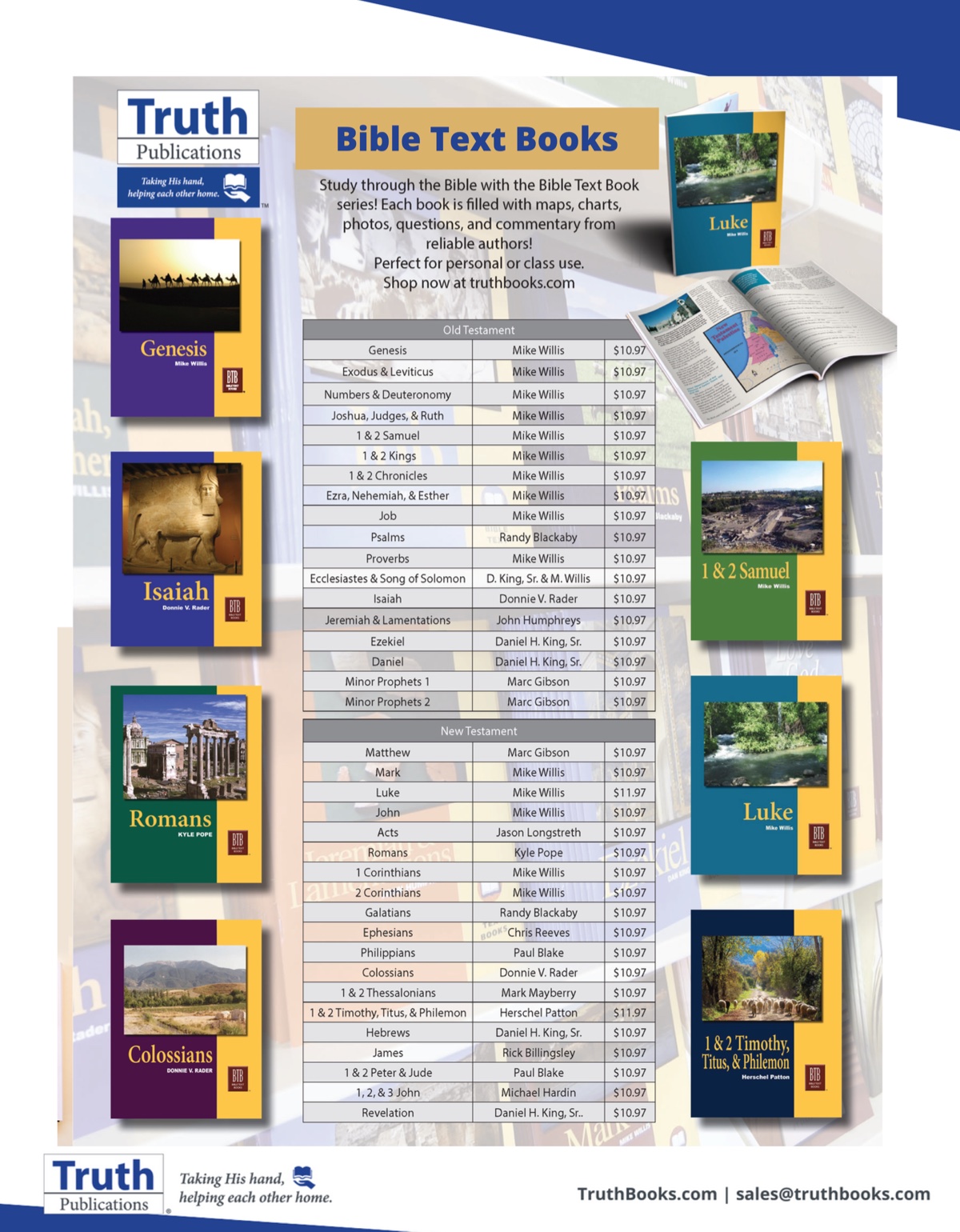
By David Weaks
Synopsis: Self-control is essential to one’s spiritual maturity. Our entrance into the kingdom of heaven depends on self-control. Faithful men and women deny themselves in their service to God.
A gospel preacher once said that Christianity is the religion of self-control. Human dogma seeks to enforce self-control with man-made rules, but God wants a man to control himself. Catholicism is famous for forbidding members to eat meat on Fridays, as well as imposing a forty-day period of fasting before Easter every year. Islam imposes strict dietary restrictions and fasting during Ramadan. Paul said such fanatical restrictions are merely “self-imposed religion. . . but are of no value against the indulgence of the flesh” (Col. 2:23, NKJV). The Lord’s church has no such obligations. Man-made deprivations cannot substitute for genuine devotion to God. True devotion is a response to one’s faith in God and his submission to God’s laws. A child of God voluntarily submits himself to divine truths in order to make himself useful for the Master. He chooses loyalty to God and righteousness over pleasure, ambition, or greed.
First, let’s define our terms. Self-control is from the Greek word egkrateia, which is defined as “self-control,” “continence,” or “temperance” (Strong, 1466). Kenneth Wuest says the word means: “possessing power, strong, having mastery or possession of, continent, self-controlled.” Self-control is self-mastery. A Christian’s spiritual development would screech to a halt if he did not add self-control to his faith, virtue, and knowledge (2 Pet. 1:5-6). A piece of steel must be tempered before it can be made into a useful knife. Wild horses must be “broken,” or brought under control, before they can be successfully ridden. In like manner, before we can serve God acceptably, bad habits must be broken, self-will must become submissive, and our every thought must become captive to the obedience of Christ (2 Cor. 10:3-6).
For though we walk in the flesh, we do not war according to the flesh, for the weapons of our warfare are not of the flesh, but divinely powerful for the destruction of fortresses. We are destroying speculations and every lofty thing raised up against the knowledge of God, and we are taking every thought captive to the obedience of Christ, and we are ready to punish all disobedience, whenever your obedience is complete (2 Cor. 10:3-6).
Self-control must be taught if people are going to develop it. Paul said, “Everyone who competes for the prize is temperate in all things. Now they do it to obtain a perishable crown, but we for an imperishable crown” (1 Cor. 9:25). In another place, Paul said: “But the fruit of the Spirit is love, joy, peace, longsuffering, kindness, goodness, faithfulness, gentleness, self-control. Against such there is no law” (Gal. 5:22-23). Paul the apostle reasoned with governor Felix about “righteousness, self-control, and the judgment to come” (Acts 24:25). Paul said that unmarried people must control their sexual desires (1 Cor. 7:9). Older men are supposed to teach younger men to have self-control: “that the older men be sober, reverent, temperate, sound in faith, in love, in patience” (Titus 2:2, 6-7). Older women should likewise be temperate and teach self-control to younger women (Titus 2:3-5). In the perilous times of the first century, Paul said men would be: “unloving, unforgiving, slanderers, without self-control, brutal, despisers of good” (2 Tim. 3:3).
Peter’s list of graces connects self-control with knowledge. This is entirely fitting because an ill-informed man will indulge himself when God does not and will restrict himself when God does not. In other words, he will add to, subtract from, and otherwise alter the word of God—allowing his preferences to supersede God’s precepts.
An abandoned child will feed himself, if he can find food, and he will drink water when he can find it. He doesn’t need instruction to feed himself, because hunger and thirst are instinctive. A teenager, who is deprived of any moral instruction at all, will eventually encounter a person of the opposite sex and seek companionship. The teen must be taught that fornication is a sin. For this, he must first be taught that there is a God who rules him. He must learn that he cannot violate God’s laws. When he learns this truth and determines to live accordingly, he will restrain himself from sin.
It is because, in the Bible, one learns that drunkenness is a work of the flesh (Gal. 5:21), and that it is addictive and destructive (Prov. 23:29-35). Wine is a mocker; it promises fun, but it delivers only destruction (Prov. 20:1). Drinking even a little alcohol (Greek potos—“tippling, drinking parties”) is contrary to the will of God (1 Pet. 4:3). Reveling and drunkenness start with the first drink. That’s just the way it is; God’s word is right! A wise man restrains himself from such a destructive path (Prov. 16:17).
It is because God’s word condemns fornication as a sin (Gal. 5:19; Eph. 5:3; Col. 3:5), and a faithful Christian consults God in such matters—not the world. In our lascivious age, there seems to be little moral restraint among men and women. Adulterous affairs were once considered evil by practically everybody. Nowadays, adultery is often accepted as a normal part of life. Husbands and wives often have paramours outside of the marriage, seemingly without shame. Parents today have waved the white flag of surrender concerning the purity of their children, asserting: “They are going to have sex, anyway; it is unrealistic to expect them to be pure at marriage, so we teach them to be safe.” However, the word of God says that fornicators and adulterers, God will judge (Heb. 13:4). In the same verse, it affirms that “marriage is honorable among all and the bed undefiled.” Fornication is a sin against one’s own body as much as it is a sin against God (1 Cor. 6:18). The knowledge of these facts causes a child of God to restrain his lust, and keep himself pure and only for his mate. Solomon teaches men to stay away from immoral, seducing women (Prov. 2:16; 5:3-6, 20), but lascivious fools will stray near her door and be destroyed by her (Prov. 7:6-24).
It is because he knows that covetousness is idolatry. Gambling is a multibillion-dollar industry in our country. You no longer must travel to Las Vegas to gamble. You can do it at the local convenience store. Ball teams and high school bands fund children’s activities with raffles, and churches have Bingo nights to raise money. Gambling used to be considered a vice by most people, but not anymore. Now, it is mainstream, but a Christian restrains himself because God calls covetousness idolatry (Col. 3:5). A Christian also knows that godliness with contentment is great gain (1 Tim. 6:6), and that the desire to be rich will cause one to fall into temptation and a snare (v. 9).
Joseph and David are object lessons of the need for self-control. Joseph, the son of Jacob, and king David stand out as polar opposites in this matter. Young Joseph lived the hardest life imaginable, and yet, he always rose above his struggles. David was a youthful hero in Israel, who killed a giant, and then went on to be king of Israel. Both men were confronted with the opportunity to commit fornication. The wife of his master, Potiphar, attempted to seduce Joseph. Although she aggressively threw herself at him, Joseph refused her without blinking an eye. His answer was clear and final: “How then can I do this great wickedness, and sin against God?” (Gen. 39:9). Centuries later, king David found himself staring at a beautiful woman who was bathing (2 Sam. 11:1-2). David should have looked away, but he did not; rather, he inquired who the woman was and was told she was the wife of Uriah the Hittite, one of David’s soldiers (v. 3). David should have looked away a second time, but he did not; he called for her to be brought to his bed, committed adultery, and fathered a child with her (v. 4). In the end, David murdered her husband, Uriah, and kept Bathsheba for himself. This is one of the sorriest stories in the whole Bible. David was “the man” who was guilty of sin (2 Sam. 12:7).
What enabled Joseph to resist what David would not? Somewhere in his past, Joseph was taught that fornication is a sin against God, and when the time came, he stood with God. Joseph denied himself something many young men would have taken gladly from Potiphar’s wife. On the other hand, David surely had the equal of Joseph’s spiritual training. Jesse raised godly sons who were each worthy of being considered the second king in Israel. The difference between the two men is stark and obvious. Joseph could not get away from sin fast enough, but David was unwilling to exercise this same level of restraint, and it nearly destroyed him. Job refused to look at a young maiden (Job 31:1). David should have made the same oath with himself and God.
Peter gives us the recipe for maturity. If one adds each of the traits in our text to his character, and abounds in them, he will be fruitful in the knowledge of our Lord Jesus Christ, and he will make his calling and election sure. Do not neglect self-control. It is a must.
Strong, James. A Concise Dictionary of the Words in the Greek Testament and The Hebrew Bible. Bellingham, WA: Logos Bible Software, 2009.
Wuest, Kenneth S. Word Studies in the Greek New Testament. Grand Rapids, MI: Wm. B. Eerdmans Publishing Company, 1984.
David Weaks, a former Catholic, obeyed the gospel in February 1985, and began preaching later that year. David and his wife, Perri, have lived in West Columbia, TX, where he has labored with the church since August 1997. They raised their two daughters in West Columbia. He can be reached here.



By Kyle Sanders
Synopsis: Perseverance is the choice that Christians make daily to continue in their Christianity.
Did you ever wonder how the slower animals reached Noah’s ark (Gen. 6:20)? It’s easy to imagine how cheetahs, horses, or various birds would have swiftly arrived at the ark, but what about the snails, tortoises, or sloths? Unless they hitched rides on swifter animals (a comical scene, to be sure), were collected by Noah’s family, or were divinely transported to the ark, their journey likely took quite a long time!
In our Christian walk, we sometimes feel more like snails than stallions. The journey of faith seems to be lengthening rather than shortening, and the path becomes like those famously traveled by our elders on their proverbial journeys to and from school (let the reader understand). Sometimes we are “soaring like eagles, on wings of flight” while sometimes we are “toiling on, toiling on, toiling on, toiling on. . .” As we “wander through the valley dim,” we tend to forget why we committed to such a quest in the first place, allowing our focus to be drawn away from the goal, and are in danger of permitting the weight of the journey in its entirety to crush any hope of reaching the “ark.”
It is in these seasons of life when perseverance must be brought to bear. It was Spurgeon who once said, “By perseverance the snail reached the ark.” Perseverance, the fifth of a list of “Christian graces” given in 2 Peter 1:5-7, is translated from the Greek word hupomonē, which means “to remain under,” or to bear up under the weight of challenges. Joseph Henry Thayer says, “In the New Testament, [it represents] the characteristic of a man who is unswerved from his deliberate purpose and his loyalty to faith and piety by even the greatest trials and sufferings” (Thayer, 644).
Here are three things we can do when the “way groweth drear” and our perseverance wanes:
One does not persevere when the motive to do so is lost. Imagine starting a road trip and then forgetting why you left. Would you keep going? I hope not! Prior to Peter’s call to persevere in 2 Peter 1:6, he describes how God, through Jesus, has given us “all things that pertain to life and godliness” (v. 3). He bestowed upon us “His precious and very great promises” (v. 4), granted us the right to become “partakers of the divine nature” (v. 4), and rescued us from “the corruption that is in the world” (v. 4). Before charging his readers to continue in their faith, Peter reminds them of the exceedingly precious gifts they have been given in Christ, empowering their perseverance with reasons to do so.
This concept of remembering our “Why” should run throughout our walk with Christ. As we draw our first conscious breath each morning, let us remember that it is God who breathed life into us (Gen. 2:7), and consider each subsequent breath a gift from Him to be used for His glory. We choose perseverance in seasons of difficulty because “the coming of the Lord is at hand” (Jas. 5:8), and we desire to be among those “who have faith and preserve their souls” (Heb. 10:39). Even our weekly participation in the Lord’s supper motivates perseverance by reminding us of why we began our journey: Christ died for us (Luke 22:19; 1 Cor. 11:24-25)! When we remember our “why,” we are empowered to keep moving forward.
As those who have taken a wrong turn understand, perseverance is positive only when one is heading in the right direction. If we have “fixed our hope on the living God” (1 Tim. 4:10, NASB), then we must be on guard against losing our focus in a few ways:
Don’t look down. Looking down while rock climbing is discouraged because one begins thinking about the consequences of failure rather than reaching the goal. As we follow Christ, we will experience persecution (2 Tim. 3:12), hardship, loss, and discouragement. We must remember that we’re not the first to have trouble and take encouragement from those who persevered and triumphed!
As an example of suffering and patience, brothers, take the prophets who spoke in the name of the Lord. Behold, we consider those blessed who remained steadfast. You have heard about the steadfastness of Job, and you have seen the purpose of the Lord, how the Lord is compassionate and merciful (Jas. 5:10-11).
Don’t look back. Sometimes the life we left behind when we decided to follow Christ beckons to us, and this can cause our steadfastness to waver. However, Jesus calls us to follow Him and not look back (Luke 9:62). When we were buried with Him in baptism, we committed ourselves to putting away “the old self with its practices” (Col. 3:9). One valuable motivation to persevere comes from remembering what would have happened if we had not chosen Christ: “But what fruit were you getting at that time from the things of which you are now ashamed? For the end of those things is death” (Rom. 6:21).
Don’t look at the sides. Perseverance requires a single-minded focus on what is ahead, and an obstinate refusal to turn from that focus, despite the temptation. Our adversary, the devil, understands this and sets about building new attractions and challenges to divert our attention away from faith in Christ, or make the weight of faithfulness unbearably heavy. The Psalmist asked God to “turn my eyes from looking at worthless things; and give me life in your ways” (119:37). We must learn to ignore the temptations to quit the journey, praying to God for strength, guidance, and relief: “Lead us not into temptation, but deliver us from evil” (Matt. 6:13).
In the martial art of Brazilian Jiu-Jitsu (or BJJ), earning a black belt can take upwards of ten years, if not more. Only 10% of practitioners reach the rank of blue belt (one rank above a beginner), and only 1% of those will reach black belt status. Many become despondent at the thought of how long it will take to achieve this goal and quit. What is the solution? Attending one practice at a time. Do the right things during each training session. Stop thinking about the entire process and focus entirely on the next step.
Perseverance can crumble under the weight of the “Big Picture.” We sometimes hear, “Be thou faithful unto death. . .” (Rev. 2:10, KJV) but wonder how we could sustain the strain of faithfulness until then (even though the wait might not be very long: James 4:14). As parents, we can balk at the immense task of raising a child to adulthood in the “discipline and instruction of the Lord” (Eph. 6:4). As we interact with ungodly co-workers or classmates, we can become frustrated at constantly “holding the line” in our beliefs and stances against worldliness. We often think about the lives of faithful men and women of Scripture in their totality, and yet forget a simple fact:
How did Abraham get to Canaan? One sandaled step at a time.
How did Josiah cleanse Judah of idolatry? One destroyed idol at a time.
How did Ezra prepare himself to teach God’s law? One line of Scripture at a time.
How did Jesus achieve His mission? One person, one parable, one precept, one prayer at a time.
How did Paul spread the gospel to the gentiles? One choice, one synagogue, one letter at a time.
Simply stated, perseverance is the commitment to always do the next right thing, and often it is helpful to narrow our attention on only that next opportunity. The next time you converse with a coworker, do so gracefully with words “seasoned with salt” (Col. 4:6). Make the next decision concerning your child, one that will emulate God’s own treatment of you as His child. Plutarch once wrote: “Perseverance is more prevailing than violence, and many things which cannot be overcome when they are together, yield themselves when taken little by little” (Parallel Lives, Sertorius, 16). Perseverance becomes much easier to accomplish when I only must persevere just one more step.
Chris Haueter, a sixth degree black belt in BJJ, once said concerning reaching the rank of black belt: “It’s not who’s good, it’s who’s left.” Christianity and faithfulness work similarly. Although Paul exhorted the Corinthians, “Do you not know that those who run in a race all run, but only one receives the prize? Run in such a way that you may win” (1 Cor. 9:24), on the day of judgment, it will not only be the one who was strongest in his knowledge of Scripture, or who performed the greatest number of good deeds, or who defended the faith at the greatest cost, that will stand with Christ. Instead, the assembled masses of the faithful will be composed of God-followers who exhibited perseverance by simply not giving up the fight who will receive a crown of righteousness (2 Tim. 4:8). Just remember: The sheep, slugs, and salamanders all had their place on the ark. They just had to keep going until they reached the boat!
Let us then be true and faithful, trusting, serving every day. Just one glimpse of Him in glory will the toils of life repay—Eliza E. Hewitt, 1898.
Thayer, Joseph Henry. A Greek-English Lexicon of the New Testament. New York: Harper & Brothers, 1889. Online.
Plutarch, Plutarch’s Lives: Sertorius. Chapter 16. Online.
Kyle Sanders has worked with the Jamestown church of Christ in Jamestown, IN, since January 2022. He and his wife, Myah, have five children. The church website is here. He can be reached here.


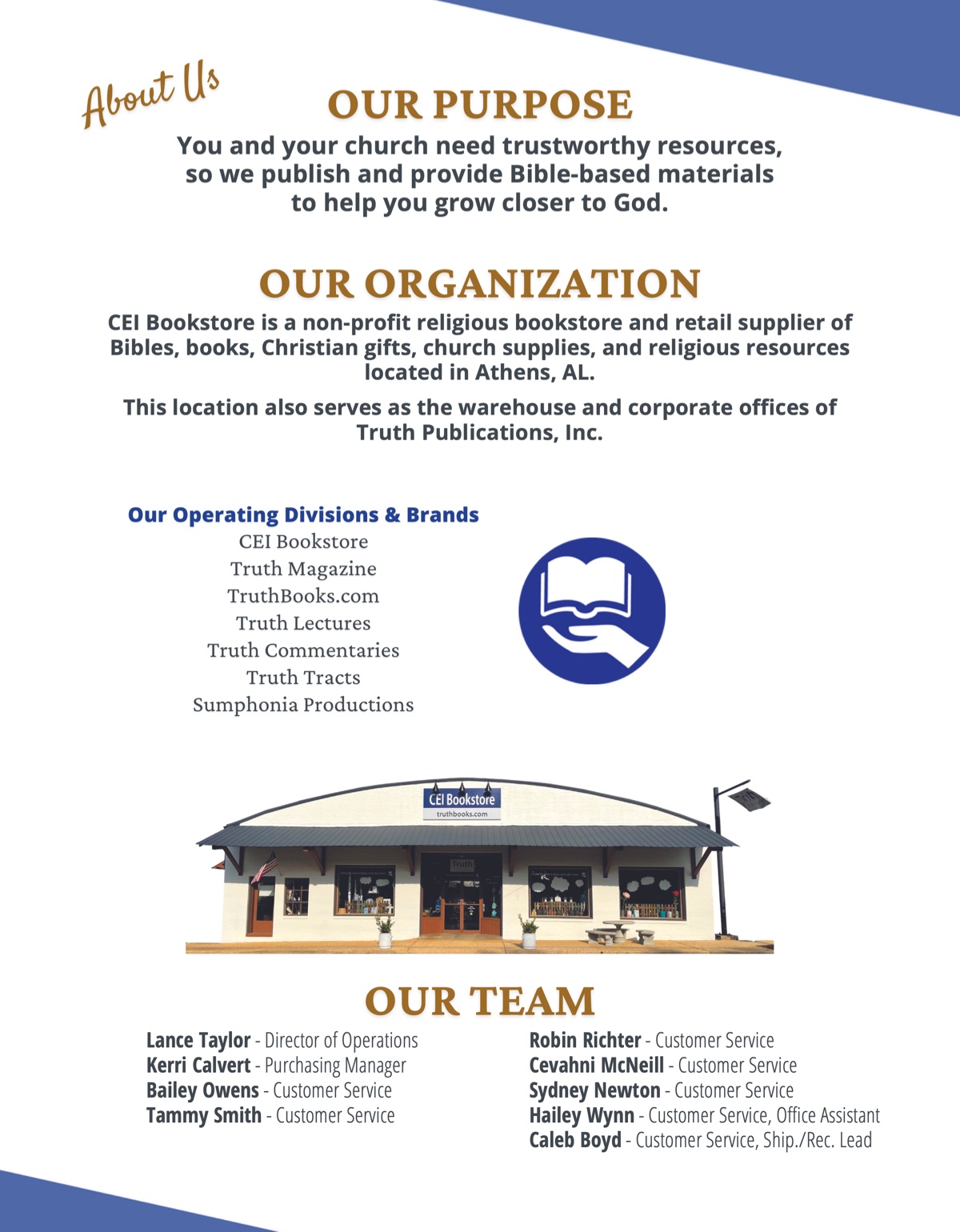
By Jim Stauffer
Synopsis: How should I understand the role of godliness in my life and how can I make it a part of my journey from here to eternity?
Applying all diligence, add to your faith. . . godliness.
Now for this very reason also, applying all diligence, in your faith supply moral excellence, and in your moral excellence, knowledge, and in your knowledge, self-control, and in your self-control, perseverance, and in your perseverance, godliness, and in your godliness, brotherly kindness, and in your brotherly kindness, love (2 Pet. 1:5-7, NASB).
The Greek word eusebeia, rendered “godliness,” refers to “piety; especially, the gospel scheme: godliness, holiness” (Strong, 2150). Thayer’s Greek-English Lexicon of the New Testament defines it as “reverence, respect; in the Bible everywhere piety towards God, godliness” (Thayer, 262). Vine says it “denotes that piety which, characterized by a Godward attitude, does that which is well-pleasing to Him” (Vine, 272). In summary, eusebeia refers to one who is reverent, devout, pious, or godly.
While our goal is to fully understand just what godliness is, the definitions of experts only go so far. Beyond just a definition of the word, we must understand how to live godly lives. That information is revealed to us by the Holy Spirit. Let us then search the Scriptures to see the contexts in which we are taught how to live godly before Him. A point of clarification may be helpful. Many people immediately translate godliness as “God-likeness,” but that definition better serves “holiness.” The two words are obviously closely related. The apostle Peter also implored us with a quotation from Leviticus: “You shall be holy for I am holy” (1 Pet. 1:16). It may help us to think of these two terms in this way: godliness, that is piety toward God, will provide us with the desire and impetus to live holy lives before Him.
When Jesus taught through His Sermon on the Mount, He summed up the attributes necessary to be a godly person. Humility, sorrow for sin, meekness and mercy from one with a pure heart leads to a reverence and piety toward God and a kind consideration of man.
In 1 Timothy 6, Paul commends godliness as an attitude of characteristic those with sound thinking. This he shows by explaining just the opposite of godliness in the lives of those who are covetous. This discussion sets up the well-known passage:
But those who want to get rich fall into temptation and a snare and many foolish and harmful desires which plunge men into ruin and destruction. For the love of money is a root of all sorts of evil, and some, by longing for it, have wandered away from the faith and pierced themselves with many griefs (vv. 9-10).
As a result, the aged apostle tells Timothy to separate himself from such men and ideas:
But flee from these things, you man of God, and pursue righteousness, godliness, faith, love, perseverance and gentleness (v. 11).
Paul continues emphasizing the concept of godliness as he mentors Timothy and Titus. He exposes men of selfish desires in 2 Timothy 3:1-5 by accusing them of being lovers of self and money, listing many of the evil thoughts and deeds of which they are guilty. He concludes by affirming that they are “holding to a form of godliness, although they have denied its power.” Timothy must, therefore, “avoid such men as these.” He further teaches the eternal benefits of godliness: “for bodily discipline is only of little profit, but godliness is profitable for all things, since it holds promise for the present life and also for the life to come” (1 Tim. 4:8).
Little value comes from understanding what godliness is if it remains out of our reach. In the verses just prior to the very text we are examining, Peter says, “Grace and peace be multiplied to you in the knowledge of God and of Jesus our Lord; seeing that His divine power has granted to us everything pertaining to life and godliness, through the true knowledge of Him who called us by His own glory and excellence” (2 Pet. 1:2-3) We gain godliness by having a true knowledge of our Savior which is obtained from His call. According to 2 Thessalonians 2:13-14, we are called through the gospel, and by it obtain the glory of Christ. Putting this together, we understand that, by coming to a true knowledge of Him, we perceive His glory and excellence and are drawn to Him by that knowledge which is obtained from hearing the gospel, the word of Christ (Rom. 10:17). Give a moment’s thought to the beauty and the joy of being drawn to this relationship based on attaining greater knowledge of our Creator and Savior.
Paul elaborates on just what true knowledge of Christ is in Philippians 3:7-11. First, he tells us of the value of knowing Christ. That value comes through “gaining Christ” and receiving “the righteousness which comes from God on the basis of faith.” Paul ends by saying, “that I may know Him and the power of His resurrection and the fellowship of His sufferings, being conformed to His death; in order that I may attain to the resurrection from the dead.” Now we understand the value of godliness as it comes from a true knowledge of Christ. This led Paul to lay aside all the grand opportunities Judaism held for him as a highly regarded rabbi in that religion. This knowledge further enabled Paul to view the persecution that persisted from his enemies as only light affliction that would pale in comparison to the glory of his eternal inheritance (2 Cor. 4:16-18).
So, how are we to gain the knowledge of which Paul speaks? One way the Greek word eusebia translates into English is “being devout” or “being given to devotion.” We must become devout in our attention to the spiritual message of the gospel. Cornelius was described as a devout man. While he was not yet a Christian, he regularly prayed to God. He was so devoted to the consideration of spiritual values that God sent an angel to give him direction to the apostle Peter for instruction in the gospel. We too must be devoted. We need to give all diligence to ensure we are approved of God (2 Tim. 2:15). We are instructed to “pray without ceasing” (1 Thess. 5:17). When our lives revolve around our concern for spiritual matters, we grasp the teaching of the Lord when He said, “If anyone wishes to come after Me, he must deny himself, and take up his cross and follow Me. For whoever wishes to save his life will lose it; but whoever loses his life for My sake will find it” (Matt. 16:24-25).
As children of God, we are called to a life of godliness. One cannot be counted as His faithful child and live an ungodly life.
For the grace of God has appeared, bringing salvation to all men, instructing us to deny ungodliness and worldly desires and to live sensibly, righteously and godly in the present age, looking for the blessed hope and the appearing of the glory of our great God and Savior, Christ Jesus, who gave Himself for us to redeem us from every lawless deed, and to purify for Himself a people for His own possession, zealous for good deeds" (Titus 2:11-14; cf. also 3:5-8)
Jesus died for us. We were purchased with His own blood—the precious blood of a lamb unblemished, the sinless Son of God (Acts 20:28; 1 Pet. 1:18-19). He did so to redeem us from our sin, from the domain of darkness (i.e., the clutches of Satan, cf. Col. 1:13-14). He did so with the purpose of changing our thoughts, desires, and conduct (Rom. 12:1-2). When thus transformed, we can clearly see the contrast of the goats and the sheep in Matthew 25:31-46. We do not practice good deeds to earn salvation, for we are saved by grace through faith (Eph. 2:8-9), but because we have attained to the level of godliness that God demands of us. The beauty of godliness in our lives is apparent to those who observe, and the peace it brings allows us to rejoice in it as the apostle Paul did, even as he suffered for Christ.
The Scriptures teach us to be like our Lord: “Therefore be imitators of God, as beloved children; and walk in love, just as Christ also loved you and gave Himself up for us, an offering and a sacrifice to God as a fragrant aroma” (Eph. 5:1-2) We understand what He was like from what He did while on the earth and especially what He did after leaving the earth. May we have the attitude of Jesus who humbled Himself and died for us in order to carry out the will of His Father (Phil. 2:5-8; John 17:4). We then must meet the standard that He has set by being the salt of the earth and light of the world, enduring the persecution that is sure to come to “all who desire to live godly in Christ Jesus” (Matt. 5:13-16; 2 Tim. 3:12).
To comprehend the value of godliness, consider what the apostle Paul, while suffering persecution, said while awaiting trial before Caesar: “Not that I speak from want, for I have learned to be content in whatever circumstances I am” (Phil. 4:11). When we love the Lord, and add godliness to our faith, we can endure all forms of persecution with joy and contentment.
Strong, James. A Concise Dictionary of the Words in the Greek Testament and The Hebrew Bible. Bellingham, WA: Logos Bible Software, 2009.
Thayer, Joseph Henry. A Greek-English Lexicon of the New Testament. New York: Harper & Brothers, 1889.
Vine, W. E. Merrill, F. Unger, and William White Jr. Vine’s Complete Expository Dictionary of Old and New Testament Words. Nashville, TN: T. Nelson, 1996.
Jim Stauffer has served the Lenexa church of Christ, Lenexa, KS, since 1982 as an elder, and since 2003, as both an elder and evangelist. He and his wife, Roberta, have two children who serve the Lord faithfully. Eric, who serves the Sterling Avenue church of Christ in Raytown, Mo. as an evangelist and Tiffany, who worships with the Richmond, KY, congregation of saints. The church website is here. He can be reached here.



By Shawn Chancellor
Synopsis: Brotherly kindness is a natural outgrowth of our appreciation for God’s redemptive work, which leads us to seek opportunities to serve those whom God has freed from the bondage of sin and redeemed in the body of Christ.
2 Peter was written to warn believers of false teachers who sought to “exploit (them) with false words” (2 Pet. 2:3). These proponents of error cast doubt on apostolic authority (2 Pet. 1:16-21), denied the deity of Jesus (2 Pet. 2:1), turned the liberties of the gospel into a license for fulfilling fleshly lusts (2 Pet. 2:12-19), and dismissed the doctrine of final judgment (2 Pet. 3:3-4).
For this reason, Peter begins his letter by reminding his audience that believers must be “partakers of the divine nature” (2 Pet. 1:4). Rather than sharing in the character of the surrounding world, they are to share in the character of God. In verses 5-7, Peter describes this character. Christians must possess and develop these qualities (2 Pet. 1:8). The believer who fails to develop this character is in danger of devolving into the immoral character of the surrounding world (2 Pet. 1:9; 2:20).
Peter’s list is arranged so we can easily see how growth in one characteristic leads to an increase in the next. Our focus in this article is on brotherly kindness in verse 7, where Peter speaks of “godliness,” “brotherly kindness,” and “love.”
Now for this very reason also, applying all diligence, in your faith supply moral excellence, and in your moral excellence, knowledge, and in your knowledge, self-control, and in your self-control, perseverance, and in your perseverance, godliness, and in your godliness, brotherly kindness, and in your brotherly kindness, love (2 Pet. 1:5-7, NASB).
“Brotherly kindness” translates the Greek term “philadelphia,” which is a compound term formed from “phileo” (love or affection) and “adelphe” (denoting a familial connection). The term is used in four other passages (Rom. 12:10, 1 Thess. 4:9, Heb. 13:1; 1 Pet. 1:22) and is translated as “brotherly love” or “love of the brethren.”
The Jews used similar familial language to describe their relationship to one another (Exod. 4:18; Josh. 14:7; 1 Chron. 28:2; Jer. 22:18). We see this in several New Testament passages as well. Consider Romans 9:3 and 10:1, where Paul refers to the Jewish people as his “brethren.” In chapter 9, he emphasizes their fleshly kinship, but chapter 10 implies a more profound connection (cf. Acts 2:29; 3:17; 13:26). The term brings to mind the bond shared within a family, particularly a nuclear family. Such bonds are largely built on shared experiences, especially the many difficulties family members face together. The Jewish people had such a shared history. This large extended family was centered on the Law and the temple as the guide for their lives and the heart of their worship. Also, they had experienced centuries of persecution from outside forces.
Describing Christians as “brethren” may indicate something even stronger. A familial, fleshly relationship is not necessary between Christians. In many local congregations, members may have few, if any, points of commonality with the saints with whom they worship. However, we all share in the sufferings of Christ, the redemption from our sins, and the struggles inherent in the Christian life. This sharing can form a bond capable of lasting through eternity.
The collection Paul gathered from the Gentile churches for churches of Judea serves as a prime example of this principle. Not only was this accomplished amid the Judaizing debate that infected churches everywhere, but most of these brethren had never met one another. Despite these obstacles, Paul said, “. . .this service is not only fully supplying the needs of the saints, but is also overflowing. . .” (2 Cor. 9:12). In verse 13, he speaks of “the proof given by this ministry” that would lead Judean Christians to “glorify God for your obedience to your confession of the gospel of Christ.” The collection served two purposes. The gift given by the Gentiles provided for the physical needs of Christians in Judea. Significantly, it also demonstrated, through concrete action, the brotherhood shared among all believers.
Bauer defines the term translated “godliness” as “awesome respect accorded to God” (BDAG, 412). Even if we limit ourselves to this simple definition, it becomes evident that brotherly love is an outgrowth of godliness. If we have “awesome respect” for God, we must deeply appreciate His work in our world. The consummation of that work is the church, the body of Christ, comprised of those who have been redeemed from their sins by the Savior’s blood (Eph. 1:7-10, 22-23). Thus, to have an appreciation for God is to have an appreciation for His people.
The more we consider the cost paid to redeem us from our sins, the more natural it becomes to love the brethren. In Romans 8:32, we find that God “. . .did not spare His own Son, but delivered Him over for us all. . .” As a father, I find this passage disturbing. I cannot conceive of loving someone else so much that I would give my child’s life for theirs. Yet, this is precisely what God did. In this act of loving sacrifice, He places a value on each of us. We were not redeemed with five shekels of silver as the sons of Israel (Num. 18:15-16). God gave the blood of His only begotten Son to free us from the bondage of sin.
What right do I have not to see that same value in each of His children? Perhaps this is why Peter says, “Since you have in obedience to the truth purified your souls for a sincere love of the brethren (philadelphia), fervently love one another from the heart” (1 Pet. 1:22). Although the term “philadelphia” does not occur in 1 John, the inspired author makes a similar connection between loving God and the love of the brethren. Consider the following verses:
We know love by this, that He laid down His life for us; and we ought to lay down our lives for the brethren (1 John 3:16).
By this we know that we love the children of God, when we love God and observe His commandments (1 John 5:2; cf. 1 John 2:8-10; 3:10; 4:7).
As previously noted, brotherly kindness should lead us to care for one another’s needs. 1 John 3:17 says, “Whoever has the world’s goods, and sees his brother in need and closes his heart against, how does the love of God abide in him?” We are to “be devoted to one another in brotherly love (philadelphia)” and “give preference to one another” (Rom. 12:10). This would aid us in navigating the “in-but-not-of” aspect of life in this world, as it would drive us to spend more time serving the brethren and less time being influenced by the ungodly.
We can also show brotherly kindness by praying for one another, extending hospitality, bearing one another’s burdens, forgiving, encouraging, and edifying one another (Rom. 12:12-13; Gal. 6:1; 1 Thess. 5:11; Eph. 4:16).
However, brotherly kindness may not always be “positive” from our perspective. Consider what we noticed about 2 Peter. The apostle warns his audience about false teachers who would “exploit” or “make merchandise” of them (2 Pet. 2:3, NASB & KJV). As part of this warning, he describes both the false teaching and the character of the false teacher. However, before so doing, he describes the character of the child of God—ending his list with brotherly kindness and love.
Some religious people would argue that rebuking error with plain language is unkind or unloving. Unfortunately, we occasionally encounter this attitude within churches of Christ. Was Peter bereft of the character that he prescribed in 2 Peter 1? Some might argue that, as an apostle, he had some special dispensation to speak as he did. However, are we to believe that Peter had to behave contrary to the character revealed in that gospel to preach the gospel and edify the brethren?
Brotherly kindness includes identifying sin, rebuking sinners, correcting the thinking of those who may be deceived, as well as the “positive” aspects mentioned above. Consider 2 Timothy 3:16, where we find that Scripture is “profitable for teaching, for reproof, for correction, for training in righteousness.”
Exercising brotherly kindness should temper our demeanor and direct our motives when we are called on to rebuke sinners for their sins. Yet, the love of the brethren demands that we take steps to bring them to repentance.
When we become children of God, we are added to a spiritual family. As in all families, each member must carry out his responsibilities. Partaking in the divine nature by demonstrating that brotherly kindness is part of the work that we are called to do. This active responsibility manifests itself in service and careful attitudes toward the brethren. Through our love of the brethren, we show a deep appreciation for God’s redeeming work and the value He has placed on each of us. Brotherly kindness often leads us to serve in enjoyable ways, but, as is always the case with love, it also calls on us to do the difficult things when our brother is in need. As we consider our various roles in the body of Christ, may we never forget to “let the love of the brethren continue” (Heb. 13:1).
Arndt, William, et al. A Greek-English Lexicon of the New Testament and Other Early Christian Literature (BDAG). Chicago, IL: University of Chicago Press, 2000.
Shawn Chancellor has worked with the South Georgia Street church of Christ in Amarillo, TX, since 2014. He and his wife, Bonnie, have one child. The church website is here. He can be reached here.


By Steven Deaton
Synopsis: Love is foundational in our relationship with God and man, and ought to manifest itself in our daily lives.
Love is a fundamental characteristic of those who wish to serve God and bless their fellow man. It is key to the two greatest commandments (Matt. 22:37-39). Peter affirmed all of this in his inspired list of “Christian graces” and, therefore, it is to be soberly considered and diligently applied in our lives (2 Pet. 1:5-7).
Interestingly, love is put at the end of the list in 2 Peter 1:5-7. This helps to emphasize that, while all the characteristics are needed in the life of a Christian, love is the highest and greatest of them all. It is similar to what Paul noted in 1 Corinthians 13:13, that of faith, hope, and love, “the greatest of these is love.”
Various sources give us a good idea of the technical definition of the Greek word agape. Joesph Henry Thayer says it means “to love, to be full of good-will and exhibit the same” (Thayer, 3). The Expositor’s Greek Testament defines it as “probably love towards all, even enemies: not directed by sense and emotion, but by deliberate choice” (TEGT, 127). Clinton Hamilton says, “This love represents a selfless interest in the welfare and benefit of the one to (or for) whom something is done” (Hamilton, 41). To restate the above, love is the decision to act in the best interest of another, even if it (1) does not benefit you, and/or (2) harms your interests, or requires a sacrifice of your well-being.
There are innumerable specific applications love takes in the course of life because it is a foundational principle that guides our thoughts, words, and actions. While we cannot cover them all, let us examine a few ways in which we can live out love.
Love of God means a life devoted to the Lord. Jesus affirmed this when He said, “You shall love the Lord your God with all your heart, with all your soul, and with all your mind” (Matt. 22:37). He emphasized total commitment to God with the entirety of our being. This can be a challenge because the world and our enemy, Satan, work against us loving God.
Our love for the Lord means that our life is about Him and His kingdom (Matt. 6:33). Being a Christian is not part of our life; it is our life. It is who and what we are. This devotion informs every aspect of our daily actions and affects our overall direction in life.
When we love God, we will worship Him in spirit and truth (John 4:23-24). This worship is distinct from other actions in life and from the vain religious conduct of others (cf. Acts 24:14). Love of God will compel us to worship Him as He has directed, not as we will. We will follow in the steps of Abel and repudiate the rebellion of Cain (Heb. 11:4; Gen. 4:1-7). In other words, we will worship by faith, not by sight; by the divine revelation, not the doctrines of men (Rom. 10:17). This means we will regularly assemble with saints to pray, sing, study God’s word, remember the Lord’s sacrifice, and make financial contributions to the local work (Heb. 10:23-25; Acts 2:42; Col. 3:16; 1 Cor. 16:1-2; etc.). If we are not doing this, we do not love God.
Further, loving God requires sacrifice—a living sacrifice of our lives (Rom. 12:1-2). This includes putting away worldly ways by renewing our minds (Eph. 4:17-24). We will also give up anything that hinders our service to God (Heb. 12:1-2). This might be hobbies or entertainment. It might even be a job or where we live. If the thing in which we are involved is detrimental to our devotion to the Savior, it needs to be removed from our lives.
Sacrifice may mean that we must sever relationships with people we love—even family. Jesus said families would be divided over acceptance or rejection of Him (Matt. 10:34-39). Some people become Christians and the rest of their family remains in the world. Others, sadly, have family members who fall away from the Lord and must be disciplined as per God’s will (1 Cor. 5:1-11; 2 Thess. 3:6-15). A lack of sacrifice reflects a lack of love for the Lord.
To love God means that we strive to be like Him, and walk in the footsteps of the Lord. As 2 Peter 1:5-7 emphasizes, growth is essential to the life of a Christian and necessary if we hope to enter eternal life (2 Pet. 1:8-11). To “grow in the grace and knowledge of our Lord and Savior Jesus Christ” demands our time, attention, and concerted effort—diligence. A child of God must engage in the study of His word and honest self-reflection (Jas. 1:21-25). Seeing how he is and where he must be, the Christian will push himself to get there, whether that means stopping a behavior, adding a new action, or increasing what is good, but lacking. An absence of growth reveals a weakness in the love of God.
Loving our fellow man can be difficult, because we all fall short of the glory of God (Rom. 3:23). People who are thoughtless or hurtful are hard to love at times. Our feelings can get in the way of our love; that is, our emotions may cloud our decision and need to act in the best interest of another. Therefore, we need to keep in mind our love of God first. What we do for others is really a reflection of our commitment to God; a service and sacrifice to Him for His glory (cf. Col. 3:23). This will require patience, forgiveness, humility, steadfastness, and prayer—much prayer (1 Thess. 5:14-17).
The first people we naturally love is family. This makes sense because it is the first relationship we experience (cf. Gen. 1:26-27). Husbands are to love their wives and their children as shown by sacrifice, honor, and devotion to their spiritual wellbeing (1 Pet. 3:7; Eph. 5:25; 6:4). Wives are to love their husbands and children, showing respect, affection, and service (Eph. 5:33; 1 Pet. 3:1-6; Titus 2:4-5). Children are to love their parents, as reflected in honor and obedience (Eph. 6:1-3). The love of family helps provide stability and strength when facing the troubles of life. Inasmuch as family is the bedrock of a healthy society, the love of family blesses the community and nation in which we live.
Christians are commanded to love their brethren (John 13:34; 15:12; Rom. 12:10). This love is motivated, in part, by the Lord’s love for us and our love for Him (1 John 4:11). There are precious few Christians in the world. Those who are Christians have shown a level of belief, dedication, and sacrifice that others have not. We ought to love them for that deep commitment and honor them for their service. They are here with us, walking through the same trials, facing challenges to their faith, and living examples that encourage us (cf. 1 Pet. 5:9). Our kind words, upright living, and consistent assembling with them show that we love the saints.
Not only are we to love our family and brethren but also the world—even our enemies. Love of the world includes the idea that we want all men to be saved. This was God’s attitude that led Him to sacrifice His Son (John 3:16). His charge to us is, “Go into all the world and preach the gospel to every creature” (Mark 16:15). When we seek for, and seize, opportunities to teach others, it is a manifestation of love for the world. However, we are called to go further.
Jesus said, “But I say to you, love your enemies, bless those who curse you, do good to those who hate you, and pray for those who spitefully use you and persecute you” (Matt. 5:44). This can be very difficult at times, but it can be done because our Savior commanded us to do it. We can be kind to the store clerk who is rude and disrespectful. We can pray for the person at work who makes our life miserable. We can do a kind deed for the neighbor who slams the door in our face when we ask him for a Bible study or to visit a gospel meeting. As David did with Saul, we can leave it up to God to hand out justice while keeping our hearts and hands clean (cf. 1 Sam. 26:7-11).
Keeping the best interest of others at the center of our lives will result in an impact for the good of our fellow man, even the salvation of souls. Having a love for God to guide us in this will ensure that we honor Him in all we do. Both will allow us to live the best life on earth and be filled with the hope of heaven.
Hamilton, Clinton D. Truth Commentaries: 2 Peter & Jude. Athens, AL: Truth Publications, 1995.
Strachan, R.H. The Expositor’s Greek Testament: Vol. V. Edited by W. Robertson Nicoll. Grand Rapids, MI: Wm. B. Eerdmans Publishing Company, 1897; Reprinted 1990.
Thayer, Joseph Henry. A Greek-English Lexicon of the New Testament. Grand Rapids, MI: Baker Book House, 1889, 1977.
Steven Deaton has worked with the Newton church of Christ in Newton, NC, since September 2020. He and his wife, Ashlie, have two children. The church website is here. He can be reached here


Note: Please send additions, corrections and updates here.
Updated: 5/1/2024
17312 Jones Rd, Athens, AL 35613
Sun. Bible Study 9:30 am | Sun. Worship: 10:20 am & 5:00 pm | Wed. Bible Study 7:00 pm
Evangelist: Jonathan Reeder | jonesroadchurch.org | 256-233-3160
514 W Market St, Athens, AL 35611
Sun. Bible Class 9:45 am | Sunday Worship 10:30 am & 5:00 pm | Wed. Bible Study 6:30 pm
Evangelist: David A. Cox | 256-232-1525 | marketstreet-church.com
24190 Wooley Springs Rd, Athens, AL 35613
Sun. Worship 9:30 am & 5:15 pm | Wed. Bible Class 7:00 pm
Evangelists: Bob Watson & Matt Taylor | mtzionchurchofchrist.org
3955 Pine Lane, Bessemer, AL 35022
Sun. Bible Study 9:10 am | Sun. Worship 10:00 am & 5:00 pm | Wed. Bible Class 7:00 pm
Evangelist: David Deason | 256-497-8127 205-425-2352 | Email | Website
2325 Old Columbiana Rd. (near I-65 & Hwy. 31)
Sun. Bible Study 9:00 am | Worship 10:00 am & 5:00 pm | Wed. Bible Study 7:00 pm
Evangelist: Kyle Pope | 205-822-0018 | Website
19965 Sandlin Rd. Elkmont, AL 35620
Sun. Worship 9:30 am & 3:00 pm | Bible Classes: 10:45 am | Wed. Bible Study 7:00 pm
Evangelist: Lance R. Taylor | 256-777-0990 | sandlinroadchurch.com
851 N. Pine St. (Located next to University campus)
Sun. Bible Study 9:30 am | Worship 10:15 am & 5:00 pm | Wed. Bible Study 7:00 pm
Evangelist: Kenny Moorer | 256-766-0403
601 Pineywood Road, Gardendale, AL, 35071 (Located 10 miles N of Birmingham)
Sun. Bible Study 9:30 am | Worship: 10:25 am & 5:00 pm | Wed. Bible Study: 7:00 pm
Evangelists: Andrew Smith & Jason Shackleford | 205-631-2131 | gardendalechurchofchrist.com
129 Hillcrest Rd, Mobile, AL 36608
Sun. Worship 9-9:30 am | Bible Study 9:30-10:30 am | Worship 10:30-11:30 am | Wed. Bible Study 7:00 pm
Evangelist: Ken Sils | 765-307-8048 | 251-342-4144 or 342-2041 | westmobilechurch.com
271 Highway 65 N, Conway, AR 72032
Sun. Bible Study 9:00 am | Worship 10:00 am & 5:00 pm | Wed. Bible Study 7:00 pm
Evangelist: Bruce Reeves | Bldg: 501-336-0052 | hwy65churchofchrist.org
2655 Prince St., Conway, AR 72034
Sun. Worship 9:00 pm | Bible class 9:50 am | Worship & Lord’s Supper: 10:40 am | Wed. Bible Class 7:00 pm
501-450-8640
2323 South 46th St.
Sun. Bible Study 9:45 am | Worship 10:30 am | Wed. Bible Study 7:00 pm
churchofchristfortsmith.com
407 Bella Vista Dr.
Sun. Bible Study 9:30 am | Worship 10:15 am & 5:00 pm | Wed. Bible Study 7:00 pm
Evangelist: Norman E. Sewell | 870-741-9104 or 870-741-5151 | cappsroad.org
514 Airport Rd.
Sun. Bible Study 10:00 am | Worship 11:00 pm & 6:00 pm | Wed. Bible Study 7:00 pm
Evangelist: Dick Blackford | 870-933-9134
145 N. Country Club Rd.
Sun. Bible Study 9:00 am | Worship 10:00 am & 6:00 pm | Wed. Bible Study 7:00 pm
Evangelist: Brenden Ashby | 520-326-3634 | churchofchristtucson.org
17903 Ibbetson Ave.
Sun. Bible Study 9:45 am | Worship 10:50 am & 6:00 pm | Wed. Bible Study 7:30 pm
562-866-5615 | roseavenue.org
3433 Studebaker Rd.
Sun. Bible Study 9:50 am | Worship 10:45 am & 5:30 pm | Wed. Bible Study 7:00 pm
JP Flores | 562-420-2363 or Mark Reeves | 562-377-1674 | justchristians.org
449 W. Allen Ave., Suite 120, San Dimas, CA 91773
Sun. Bible study 10:00 am | Worship 11:00 pm & 4:00 pm | Wed. Bible Study 7:30 pm
909-788-9978 | sandimaschurchofchrist.com
126 West Harvard St. | Suite 6
Sun. Bible Study 9:30 am | Worship 10:30 am
Evangelist: Richie Thetford | poudrevalleychurchofchrist.org
1414 Hawk Parkway, Unit C
Sun. Worship 11:00 pm | Bible Study 2 pm & 1:30 pm
970-249-8116 | sanjuanchurchofchrist.org
64 Casting Lake Rd.
Sun. Bible Study 9:00 am | Worship 10:00 am & 6:00 pm | Wed. Bible Study 7:00 pm
850-622-3817 | southwaltonchurchofchrist.com | Location change coming in 2022: 497 Church St Santa Rosa Beach, FL 32459
196 Ave C, Geneva, FL 32732
Sun. Bible Study 10:00 am | Worship 10:45 am
(689) 229-9888 | ChurchofChristatGeneva.com
6 Lane Dr., Mary Esther, FL 32569
Sun. Bible Study 9:30 am | Worship 10:30 am & 5:00 pm | Wed. Bible Study 7:00 pm
850-244-9222 | mecoc.org | Evangelist: Chris Simmons | chrissimmons6ten@gmail.com
3940 S. Bumby Ave.
Sun. Communion: 9:30 am | Bible Study 10:00 am | Praise & Preaching: 10:55 am (No pm Service) | Wed 7:00 pm
Evangelist: Ken Chapman
Office: 407-851-8031 | bumby.org | Note: Please call for current worship and Bible study times.
621 E. Wheeler Rd.
Sun. Bible Study 10:00 am | Worship 10:50 am & 6:00 pm | Wed. Bible Study 7:30 pm
Evangelist: Bobby Witherington | 813-684-1297 | seffnercoc.org
Route 116 (near Callaway Gardens)
Sun. Bible Study 10:00 am | Worship 11:00 pm & 6:00 pm | Wed. Bible Study 7:30 pm
Evangelist: Tommy W. Thomas | 706-628-5117 or 628-5229 | pmvchurch.com
370 N. Shilling | P.O. Box 158-83221
Sun. Bible Study 10:00 am | Worship 11:00 pm | Wed. Bible Study 7:30 pm
208-785-6168 or 681-1552
1310 NE 54th Ave, Des Moines, IA 50313
Sun. Bible Study 9:45 am | Worship 10:40 am | Wed. Bible Study 7:00 pm
515-262-6799 | www.dsmcoc.com
1236 63rd St. (Dir: 1.5 miles E of I355)
Sun. Bible Study 9:00 am | Worship 9:55 am & 6:00 pm | Wed. Bible Study 7:30 pm
Evangelist: Steve Wolfgang | 630-968-0760 | dgcoc.org
796 Prairie Ave.
Glen Ellyn, IL 60137
Sun. Bible Study 9:30 am | Sun. Worship 10:30 am & 5:00 pm
Evangelist: Keith E. Brown | 630-858-2290 & 630-377-3990
1100 S. 17th St.
Sun. Bible Study 9:30 am | Worship 10:30 am & 6:00 pm | Wed. Bible Study 7:00 pm
217-234-3702
16224 S Vincennes Ave.
Sun. Bible Study 9:00 am | Worship 10:00 am & 4 pm | Wed. Bible Study 7:00 pm
Evangelist: Donald Hawkins | 708-339-1008 | southeastchurchofchrist.com
Meeting @ Sleep Inn Suites and Motel | 1101 North Cummings Lane, Washington, IL 61571
Sun. Worship: 11:30 am | Bible Study: 12:30 pm | Wed. Bible Study 6:30 pm @ home of Tim Sundlie, call for address
Evangelist: Tim Sundlie | 608-796-9028 | sunbeads1@gmail.com | tazewellcococ.org
407 W Lewis and Clark Parkway, Clarksville, IN 47129
Sun. Bible Study 9:30 am | Worship 10:30 am & 6:00 pm | Wed. Bible Study 7:30 pm
Elders: Allen L. Morris (812) 989-5838 and Stephen W. Nale (502) 727-7559 or (812) 944-2305 | clarksvillechurchofchrist.org
Sun. Bible Study 9:30 am | Worship 10:30 am | Wed. 7:00 pm
765-676-6404 | jamestowncoc.com
15530 Herriman Blvd, 46060
Sun. Bible Study 10:00 am | Worship 11:00 am | Wed. Bible Study 7:00 pm
Evangelist: John Smith | preacherjohn54@att.net | 317-501-8035 or 317-501-0249 or 317-701-1204
400 Lafayette Ave. | P.O. Box 34
Sun. Bible Study 9:45 am | Worship 10:30 am & 6:00 pm | Wed. 7:00 pm
812-279-4332
(First St. & Karnes Ct.)
Sun. Bible Study 9:45 am | Worship 10:30 am & 5:00 pm | Wed. Bible Study 7:00 pm
Evangelist: Jeremy Goen | 812-967-3437 or 967-3520 | pekinchurchofchrist.com
302 S. Fourth Ave., Mulvane KS 67110 | Mail: PO Box 11
Sun. Bible Classes: 10:00 am | Worship 11:00 am | Wed. Bible Study 7:00 pm
Evangelist: Jay Horsley | 316-644-8503 | mulvanechurch.com | mulvanechurch@gmail.com
5600 SW 17th St, Topeka, KS 66604
Sun. Bible Study 9:15 am | Sun. Worship 10:30 am | Wed. Bible Study 7:00 pm
785-235-8687 or 785-273-7977 | 17thstreetchurchofchrist.org
1235 Williams St.
Sun. Worship 10:00 am | Bible Study After am Worship & 6:00 pm | Wed. Bible Study 7:00 pm
Evangelist: Jerid Gunter | 270-274-4451
8081 US Hwy 68-East, Benton, KY 42025
Sun. Bible Study 9:00 am | Worship 10:00 am | Wed. Bible Study 6:00 pm
270-354-9451 | fairdealingmarc@gmail.com | churchofchristatfairdealing.com | Conveniently located near Kenlake State Resort Park on the western shore of Kentucky Lake.
612 Broadway
Sun. Bible Study 9:45 am | Worship 10:30 am & 5:00 pm | Wed. Bible Study 6:30 pm
Evangelist: Charles J. White | 270-422-3878
107 Sunny Hill Dr.
Worship 9:30 am & 11:30 am | Bible Study 10:30 am | Wed. Bible Study 7:00 pm
Evangelist: Steve Lee | 270-789-1651 | sunnyhillcoc.com
103 N. Main St. | P.O. Box 233
Sun. Bible Study 10:00 am | Worship 10:45 am & 5:00 pm | Wed. Bible Study 7:00 pm
Evangelist: Jarrod Jacobs | 270-589-4167 or 270-274-3065
385 E. Lexington Ave.
Sun. Worship 10:00 am | Bible Study 11:15 am & 5:00 pm | Wed. Bible Study 7:00 pm
Evangelist: B.J. Sipe | 859-236-4204
18 Scott Drive, Florence, KY 41042
Sun. Worship 9:30 am & 5:30 pm | Sun. Bible Study 10:30 am | Wed. Bible Study 7:00 pm
859-371-2095 | nkcofc.com
1733 Bowling Green Rd.
Sun. Bible Study 9:00 am | Worship 10:00 am & 6:00 pm | Wed. Bible Study 7:00 pm
Evangelist: Steve Monts | 270-776-9393 | 31wchurchofchrist.com
733 Mill St. Leitchfield, KY 42754
Sun. Bible Study 9:30 am | Worship 10:00 am Communion 10:55 am | Wed. Bible Study 6:00 pm
270-230-6144 | millstreetchurchofchrist.org
1803 Dixie Garden Dr.
Sun. Bible Study 9:30 am | Worship 10:30 am & 6:00 pm | Wed. Bible Study 7:00 pm
Evangelist: Michael Hardin | michaelhardin1123@att.net | 502-937 2822
3221 East Hebron Lane
Sun. Bible Study 9:00 am | Worship 10:00 am & 5 pm | Wed. Bible Study 7:30 pm
Evangelist: Danny Linden & Ron Halbrook | 502-957-5115 or 502-955-1748 | hebronlanechurchofchrist.com
405 Orice Roth Rd. | 70737 (Baton Rouge area)
Sun. Bible Class 9:30 am | Worship 10:30 am & 6:00 pm | Wed. Bible Study 7:00 pm
Evangelist: R.J. Evans | rjevans@eatel.net | 225-622-4587
856 Brighton Ave. (Breakwater School) | Leave Maine Turnpike at Exit 48
Sun. Bible Study 10:00 am | Worship 11:00 pm w/ second service immediately following am worship | Mid-week Bible Study (please call for times & places)
207-839-3075 or 839-8409
3084 Creek Drive SE, #1-C, Kentwood, MI 49512 | P.O. Box 8446, Kentwood, Mich. 49508 (Grand Rapids area)
Sun. Worship 11:00 am | Sun. Bible Study 12:30 pm | Wed. Bible Study 7:00 pm
Evangelist: Joseph Gladwell | cedarsprings98@gmail.com
414 South Main Street
Sun. Bible Study 10:00 am | Worship 11:00 am | Wed. Bible Study 6:00 pm
Evangelist: Ryan Thomas | 810-837-1302 or 989-389-3226 | northernmichiganchurchofchrist.com
2914 7th St.
Sun. Bible Study 9:00 am | Worship 10:00 am
2820 Grandview Ave.
Sun. Bible Study 10:00 am | Sun. Worship 11:00 pm | Wed. 6:30 pm
Ron Cooper: 601-934-3675 | roncooper@bellsouth.net
Ricky Ethridge: 601-737-5778 | rickymarsha@bellsouth.net
2110 E State Line Rd. (Exit I-55) (Memphis area)
Sun. Bible Study 9:30 am | Worship 10:30 am | Wed. Bible Study 7:00 pm
Evangelist: James A. Brown | Bldg: 662-342-1132
805 Meadow Rd, Severn, MD 21144
Sun. Bible Study 10:00 am | Sun. Worship 11:00 pm & 6:00 pm | Wed. Bible Study 7:30 pm
Evangelist: Brandon Trout | 410-969-1420 or 410-551-6549 | swcofchrist.com
422 N Linton St., Blodgett, MO 63824
Sun. Worship 10:00 am | Wed. Bible Study 7:00 pm
Evangelist: Russell Rice | 573-475-0417
4000 SW Christiansen
Sun. Worship 9:00 pm | Bible Study 10:00 am | Worship 11:00 pm | Wed. Bible Study 7:00 pm
Evangelist: Brett Hogland | 816-228-9262
432 Eagle Rock Rd, Branson, MO 65616
Sun. Worship 9:30 am | Bible Study 10:30 am | Sun. Evening Worship 5:00 pm | Wed. Bible Study 6:00 pm
Evangelist: Philip North | 417-239-1036 | primrosenor@suddenink.net | eaglerockroadchurchofchrist.org
2912 Bloomfield Rd
Sun. Bible Study 9:15 am | Worship 10:00 am | Wed. Bible Study 7:00 pm
Seth McDonald & Jerry Lee Westbrook | 573-837-1001 | capecountycoc@gmail.com | capecountycoc.com
217 N. Orchard Blvd.
Sun. Bible Study 9:00 am & 10:00 am | Worship 11:00 pm | Wed. Bible Study 7:00 pm
Evangelist: Walter Myers | 417-830-8972 or 417-736-2663
703 Harrison St.
Sun. Bible Study 10:00 am | Worship 11:00 pm & 6:00 pm | Wed. Bible Study 7:00 pm
Evangelist: Nolan Glover | 870-650-1648 | westsidechurchofchrist.us
685 Sidney St.
Sun. Bible Study 9:30 am | Worship 10:15 am & 5:00 pm | Wed. Bible Study 7:00 pm
Evangelist: Lynn Huggins | 573-265-8628
2727 County Line Rd.
Sun. Bible Study 9:00 am | Worship 9:50 am | Wed. Bible Study 7:00 pm
816-279-4737 | countylinechurchofchrist.com
Bell St & S 7th St. Beatrice, NE 68310
Sun. Bible Study 9:00 am | Worship 10:00 am & 6:30 pm
402-233-4102 or 402-228-3827 | churchofchrist7bell.org
5327 S. Tryon Street, Charlotte, NC 28217
Sun. Bible Study 9:30 am | Sun. Worship 10:30 am | Wed. Bible Study 7:30 pm
704-525-5655 | charlottechurchofchrist.org
3781 East Highway 27, Iron Station, NC 28080
Sun. Bible Study: 10:00 am | Sun. Worship 11:00 am & 6:00 pm | Wed. Bible Study 7:00 pm
Evangelist: Stan Adams | 704-748-9777 (Bldg) & 704-748-3747 (Jerry) | lincolnncchurch@gmail.com | lincolncoc.com
1031 Welford Dr, Beavercreek, OH 45434 (located a few miles E of Dayton)
Sun. Short Worship: 9:30 am | Bible Study 10:05 am | Sun. Worship 11:00 am | Wed. Bible Study Adults: 1:00 pm & All ages: 7:00 pm
Evangelist: Heath Rogers | 937-426-1422 | knollwoodchurch.org
28 W. Main St., Dayton, OH 45449
Sun. Worship 9:00 pm | Bible Study 9:30 am | Worship 10:25 am | Wed. Bible Study 7:00 pm
Evangelists: Michael Grushon 937-866-5162 or Alan Beck 937-469-3311 | wc-coc.org
6417 Franklin-Lebanon Rd. Franklin, OH 45005
Sun. Bible Study 10:00 am | Worship 10:45 am | Tues. Bible Study 6:30 pm
Evangelist: Josh Lee | 937-789-8055 or 937-746-1249 | franklin-church.org
687 Mansfield-Lucas Rd. Mansfield, OH 44907
Sun. Bible Study 10:00 am | Worship 10:45 am | Wed. Bible Study 4:30 pm
James Bond: 419-564-3878 | Mr. Kim Walton: 419-651-3488 | Bldg: 419-522-8982 | northsidecofc.us
1973 W Main St. New Lebanon, OH 45345
Sun. Bible Study 9:30 am | Worship 10:30 am, & 5:00 pm | Wed. Bible Study 7:00 pm
Evangelist: Bruce Hastings | 937-687-7150 or 937-478-0367
80 Sandhill Rd. Reno, OH 45773
Sun. Bible Study 9:30 am | Worship 10:30 am & 6:30 pm | Wed. Bible Study 7:00 pm
Evangelist: Mark Childers | 304-615-1091 | 740-374-9827 | mariettarenochurchofchrist.org
4110 Frey Rd., Northwood, OH 43619 (Toledo Area)
Sun. Worship 11:00 pm
Evangelist: Donald Jarabek | 419-893-3566 & 567-331-2269
33226 Children’s Home Rd., Pomeroy, OH 45769
Sun Worship 10:00 am & 5 pm | Bible Study 11:00 am | Wed. Bible Study 6:00 pm
Jack Hunt | wmhunt55@gmail.com | 740-645-4612 | Find us on Facebook!
2120 No. A St.
Sun. Bible Study 9:45 am | Worship 10:45 am & 5:30 pm | Wed. Bible Study 7:00 pm
Evangelist: Rob Lungstrum | 918-931-1362 or 918-423-3445
4110 NE 122nd Ave #101, Portland, OR 97230
Sun. Bible Study 10:00 am | Worship 11:00 am | Thur. Bible Study 7:00 pm
Evangelist: Samuel A. Matthews | 971-331-2838 | Bldg: 503-432-8697 | samatm@comcast.net | libertynwchurchofchrist.org
3702 E. Long St.
Sun. Bible Study 9:30 am | Worship 10:30 pm & 5:30 pm | Wed. Bible Study 7:30 pm
Bldg: 541-367-1599 | http://www.sweethomechurch.com | churchsweethome@yahoo.com
7222 Germantown Ave, Philadelphia, PA 19119
Sun. Bible Study 10:15 am | Sun. Worship: 11:15 am | Tues. Bible Study: 7:00 pm
Evangelist: James H. Baker, Jr. | 215-248-2026 | mtairychurchofchrist.org
3370 Broad St. Extension
Sun. Bible Study 9:30 am | Worship 10:30 am & 5:30 pm | Wed. Bible Study 7:00 pm
Evangelist: A.A. Granke, Jr. | 803-499-6023
4013 Edmund Hwy. (Hwy. 302), West Columbia, SC 29170
Sun. Bible Study 9:30 am | Sun. Worship 10:30 am & 5:00 pm | Wed. Bible Study 7:00 pm
Evangelist: Jerry Cleek | 219-313-1108 | Website
417 Mooresville Pike | (Located .8 mi. N. of Hwy. 50/Jas. Campbell)
Sun. Bible Study 9:30 am | Worship 10:30 am & 3:30 pm | Wed. Bible Study 7:00 pm
931-388-5828 or 931-381-7898 | mooresvillepikecoc.com
4894 Hooper Hwy. | 37722 | (Located 15 mi. E. of Gatlinburg on Hwy. 321)
Sun. Bible Study 10am | Worship 11:00 pm & 5:00 pm | Wed. Bible Study 6:00 pm
Evangelist: Olie Williamson | 423-487-5540 or 423-748-0844
350 N Main St. Kingston Springs, TN 37082
Sun. Bible Study 9:00 am | Worship 10:00 am & 5:00 pm | Wed. Bible Study 7:00 pm
kscoc.com
108 Locust St.
Sun. Bible Study 9:30 am | Worship 10:30 am & 5:00 pm | Wed. Bible Study 7:00 pm
Evangelist: Daniel H. King, Sr. | 931-379-3704 or 931-964-3924 | lscoc.com
1110 Cason Lane
Sun. Bible Study 9:00 am | Worship 10:00 am & 5:00 pm | Wed. Bible Study 7:00 pm
Bldg: 615-896-0090 | casonlanechurch.org
2091 Pitts Ln, Murfreesboro, TN 37130 (located at the corner of Northfield Blvd and Pitts Lane)
Sun. Bible Study 9:30 am | Sun. Worship 10:30 am & 6:00 pm | Wed. Bible Study 7:00 pm
Evangelist: David Bunting | 615-893-1200 | GodsRedeemed.org
7471 Charlotte Pike
Sun. Bible Study 9:00 am | Worship 10:00 am & 5:00 pm | Wed. Bible Study 7:00 pm
Evangelist: Lee Wildman | 615-952-5458 or 615-356-7318
423 Donelson Pike
Sun. Bible Study 9:00 am | Worship 9:55 am & 5:00 pm | Wed. Bible Study 7:00 pm
Evangelist: Johnny Felker | 615-883-3118 | perryheights.faithweb.com
1414 W. Exchange Pkwy
Sun. Bible Study 9:00 am | Worship 10:00 am & 5:00 pm | Wed. Bible Study 7:00 pm
Evangelist: Jerry King 214-504-0443 or 972-727-5355 | twincreekscoc.com
E. Service Rd. off I-35, N. of Alvarado
Sun. Bible Study 10:00 am | Worship 11:00 pm & 6:00 pm | Wed. Bible Study 7:00 pm
817-295-7277 or 790-7253
605 E. Adoue St., Alvin, TX 77511
Sun. Bible Study 9:30 am | Worship 10:30 am & 5:00 pm | Wed. Bible Study 7:30 pm
Evangelist: Mark Mayberry | mark@ascoc.org | ascoc.org
701 North Pruett St.
Sun. Bible Study 9:45 am | Worship 10:40 am & 6:30 pm | Wed. Bible Study 7:00 pm
Bldg: 281-422-5926 | Weldon: 713-818-1321 | biblework.com
2919 Main St/FM 517 E., Dickinson, TX 77539
Sun. Bible Study 10:00 am | Sunday Worship 11:00 am & 6:00 pm | Wed. Bible Study 7:00 pm
713-298-6673
301 Robison St.
Sun. Bible Study 9:30 am | Worship 10:30 am & 6:00 pm | Wed. Bible Study 7:00 pm
Evangelist: Phillip Stuckey | 361-782-5506 or 361-782-2844 | ednachurchofchrist.org
3277 Pendleton Rd.
Sun. Bible Study 9:30 am | Worship 10:30 am & 5:00 pm | Wed. Bible Study 7:00 pm
915-855-1524
4303 18th St, Bacliff, TX 77518
Sun. Bible Study 9:00 am | Sun. Worship 10:00 am & 6:00 pm | Wed. Bible Study 7:00 pm
Evangelist: Richard Lay | bacliffchurchofchrist.org
6110 White Settlement Rd. 76114
Sun. Bible Study 9:30 am | Worship 10:30 am & 6:00 pm | Wed. Bible Study 7:30 pm
817-738-7269
Old Granbury Rd Church of Christ
4313 Old Granbury Rd, Granbury, TX 76049
Sun. Bible Study 9:30 am | Sun. Worship 10:30 am | Wed. Bible Study 7:00 pm
Evangelist: Chip Foster | 817-913-4209 or 817-279-3351 | oldgranburyrdchurch.org
2510 Fry Rd, Houston, TX 77084
Sun. Bible Study 9:45 am | Worship 10:30 am & 6:00 pm | Wed. Bible Study 7:00 pm
Evangelist: David Flatt | fryroad.org | church@fryroad.org
2320 Imperial Dr. (Located close to DFW Airport)
Sun. Bible Study 9:00 am | Worship 9:50 am & 6:00 pm | Wed. Bible Study 7:30 pm
Evangelist: Mark Roberts | 972-986-9131 | justchristians.com
6111 Indiana Ave, Lubbock, TX 79413
Sun. Bible Study 10:00 am | Sun. Worship 9:00 am & 11:00 am | Wed. Bible Study 7:00 pm
806-795-3377 | lubbockchurch.com
1820 Mansfield Webb Rd, Mansfield, TX 76063
Sun. Bible Study 9:30 am | Sun. Worship: 10:20 am & 5:00 pm | Wed. Bible Study 5:30 pm.
Evangelist: Tom Roberts | 817-996-3926 | northsidecofc.us
612 S Shawnee St, Nacogdoches, TX 75961
Sun. Bible Study 9:45 am | Worship 10:30 am & 6:00 | Wed. Bible Study 6:00 pm
Minister: Van Dennis | 936-615-2950
3831 N.E. Stallings Dr.
Sun. Bible Study 9:30 am | Worship 10:20 am & 6:00 pm | Wed. Bible Study 7:00 pm
Evangelists: Randy Harshbarger & Jay Taylor
268 Utopia Ave. (Dir: I-37 S.E. Exit Pecan Valley)
Sun. Bible Study 9:30 am | Worship 10:30 am & 5:00 pm | Wed. Bible Study 7:00 pm
Evangelist: Jesse Garcia | 210-660 0409 | pecanvalleychurchofchrist.org
314 N. Tolbert
Sun. Bible Study 9:30 am | Worship 10:30 am & 5:00 pm | Wed. Bible Study 7:00 pm
Evangelist: Ronald Stringer
4404 Twin City Blvd.
Sun. Bible Study 9:30 am | Worship 10:30 am & 6:00 pm | Wed. Bible Study 7:30 pm
Evangelist: Jason Garcia (yourfriendjgar@gmail.com) or (leonvalleychurch@gmail.com) | 254-939-0682 | leonvalleychurch.org
2301 Franklin Dr., Texarkana, AR 71854
Sun. Bible Study 9:30 am | Worship 10:15 am | Wed. Bible Study 7:00 pm
870-772-0746 | txkchurch.com
340 E Warren St. (in Hewitt, a suburb of Waco)
Sun. Bible Class 9:30 am | Worship 10:30 am & 5:00 pm | Wed. Bible Study 7:00 pm
Evangelist: Marc Smith | 254-292-2482 or 652-7698
4500 Kell West Blvd, Wichita Falls, TX 76309
Sun. Bible Class 9:30 am | Worship 10:30 am & 3:30 pm | Wed. Bible Study 6:30 pm
Evangelist: Dennis L. Scroggins | 512-626- 5702 | dennis.scroggins@gmail.com | floralheightschurchofchrist.org
Please mail all correspondence to 1504 Hayes St, Wichita Falls, TX 76309
Meeting in the Capital City Grange Hall, 6612 Route 12 Berlin, VT 05602
Sun. Bible Study 9:00 am | Worship 10 am | Tues. Evening in Homes
Evangelist: Open | montpelierchurchofchrist.com | P.O. Box 70, Williamstown, VT 05679 | For questions or directions: Wade Holt 802-485-4311
217 Taxus St., Chesapeake, VA 23320
Sun. Bible Study 10:00 am | Worship 11:00 am & 5:00 pm | Wed. Bible Study 7:00 pm
Evangelist: Steven Matthews | 757-436-6900 | tidewaterchurchofchrist.com
8330 Doublecreek Court, Chesterfield, VA 23832 (Located in teh Metro Area; Courthouse Rd. at Double Creek Ct. 2.2 miles S of Rt. 288)
Sun. Bible Study 9:30 am | Worship 10:30 am & 5:00 pm | Wed. Bible Study 7:00 pm
Evangalist: Nathan L. Morrison | 804-778-4717 | courthousechurchofchrist.com
1208 W. 41st St.
Sun. Bible Study 10:00 am | Worship 11:00 pm & 6:00 pm | Wed. Bible Study 7:00 pm
Evangelist: Jack Bise, Jr.
2970 Old Leaksville Rd.
Sun. Bible Study 10:00 am | Worship 11:00 pm & 5:30 pm | Wed. Bible Study 7:00 pm
276-956-6049 | churchofchristatridgeway.com
929 Indiana Ave. NE (5 min. from Roanoke Convention Center)
Sun. 1st Lesson 9:15 am | Bible Study 10:00 am | Worship 11:00 pm | Wed. Bible Study 7:30 pm
Evangelist: Brent Paschall | 540-344-2755 | blueridgecoc.org
5652 Haden Rd.
Sun. Bible Study 10:00 am | Worship 11:00 pm
Robert Mallard | 757-464-4574
1860 Mt Baker Hwy, Bellingham, WA 98226,
Sun. Bible Study 9:30 am | Worship 10:30 am & 6:00 pm | Wed. Bible Study 7:00 pm
Evangelist: Steven J. Wallace | 360-752-2692 or 806-787-5088 | mtbakercoc.com & revelationandcreation.com
Meeting at Gray Middle School, 6229 S. Tyler St., Tacoma, WA 98409
Note: Please see webpage for updated meeting location and times.
Sun. Bible Study 10:00 am | Worship 11:00 pm | Wed. Bible Study 7:00 pm (Online)
253-242-3098 | tacomachurch@gmail.com | tacomachurch.com
7 Old Davisson Run Rd, Clarksburg, WV 26301
Sun. Bible Study 9:30 am | Worship 10:20 am
304-622-5433 | wsccoc.com | info@wsccoc.com
1929 Morgantown Ave.
Sun. Bible Study 10:00 am | Worship 10:45 am & 6:00 pm | Wed. Bible Study 7:00 pm
304-363-8696 or 304-844-2437
210 Cedar Ave, Moundsville, WV 26041
Sun. Bible Study 9:30 am | Sun. Worship 10:30 am & 6:00 pm | Wed. Bible Study 7:00 pm
Evangelist: Tony Huntsman | 304-845-4940 | cedarsower.com
803 20A Ave NE, Calgary AB T2E 1S1
Sun. Bible Study 10:00 am | Sun. Worship 11:00 am & 6:00 pm | Wed. Bible Study 7:00 pm
Evangelist: Eric Castillo | +1-403-619-1249 | churchofchristcalgary.com

